#people who have self esteem/self loathing issues are generally seen as like
Text
saw a post talking about bethany and carver and how strange their fanon characterizations are, and tumblr kept messing up and i couldn’t reblog it, so i’m making my own post with what i put in the tags
bethany and carver both hate their lives, even before they come to kirkwall. the difference is that carver blames hawke for it, while bethany blames herself. and i think some of the reason the former gets so much more meta/sympathy/etc is because self-esteem issues are a muddy and uncomfortable thing to talk about, and it’s easier to talk about carver’s issue. he has a scapegoat and a built-in success story: as soon as he strikes out on his own, he’ll be all right
i think bethany is less popular for a lot of reasons. first of all, mage seems to be a disproportionately popular class, so some people would never even meet her. also, she doesn’t make a very strong first impression. a lot of people think she’s bland so they wouldn’t be interested in keeping her in the party and getting to know more about her. because at first glance, she is the mild-mannered polite perfect daughter character. that’s who she has to be, because it averts suspicion from the templars if she follows the rules, sure, but also because it’s how she makes it up to her family for being a mage. they’ve already done so much for her without even asking; how could she possibly inconvenience them any more? she’s a burden just by existing, so she has to do everything she can, be as unobtrusive as possible, to make up for that
#bethany hawke#dragon age#i wonder a lot how much of the hawke family canon is just. people projecting their own family issues onto them tbh#like carver as the neglected middle child. bethany as the beloved youngest who the other two resent. leandra being emotionally manipulative#etc#i’m not trying to put carver down to lift bethany up#i think they’re both wonderfully written#and it’s always confused me why he’s so much more popular#it’s probably just because. one is easier to talk about.#i won’t lie i’ve definitely related to bethany during some Bad Times#people who have self esteem/self loathing issues are generally seen as like#immature and whiny. but imo bethany’s issue is more akin to like internalized homophobia or something#because it’s a deeper systemic issue that isn’t just going to disappear when she learns self confidence#and as she grows up that resentment transfers#from herself to the world at large for being like this. for making her and people like her feel that way#rip i forgot to put these in the tags at first. i hope saving it will do that
318 notes
·
View notes
Text
Why I think Izzy’s death was actually necessary despite me being sad about losing my favorite* character…
So I am once again looking to reframe a moment/scene involving Izzy around Ed because as much as Izzy was his own character (with a wonderful redemption arc) his function in the narrative imo is as an extension of the Blackbeard persona and therefore Ed and his perception of himself
Ok so this is gonna be long but I think it’s necessary to frame this properly
Izzy and Ed’s relationship is one of misery loving company and instead of finding ways to legitimately pull each other up and heal from whatever brought you to that place it turns to one of toxicity where you either repress the trauma (Ed never telling anyone that he killed his father, that he feels like a monster) or express it in ways that only perpetuate the misery. At this point that constant cycle of misery is so familiar it can be difficult for the participants to recognize what they’re doing to themselves and each other and it’s difficult to not fall back into those patterns.
So while Izzy is making strides and having his arc, instead of saying to Ed maybe don’t go looking for darkness when you’re standing in the light, don’t look for trouble or problems that don’t exist just because that’s what you’ve come to expect he says maybe you’re just a mopey twat and there isn’t a fuckin storm, when Ed does apologize for his leg Izzy’s only response is fuck off.
They can’t communicate with each other effectively and it’s already caused issues. When Izzy tells Ed to listen to the feeling of throwing away the trappings of Blackbeard, Ed does but he has also been told by Izzy that Ed isn’t good enough so why would Stede want him now that he’s not gonna be Blackbeard. I think Izzy meant well and had the right sentiment but the fact is that the damage of what they do to each other has already been done. Izzy doesn’t just represent the devil on Ed’s shoulder, he’s the voice in his head telling him he’s worthless without Blackbeard.
So could the narrative have just said Izzy went off on his own or went with the crew in the end? imho no they couldn’t because in order to have a healthy relationship with Stede, and just to be a generally well adjusted person Ed needs to love himself and the constant knowledge that his self loathing can just pop up out of nowhere (something explicitly shown as an Izzy staple) won’t allow him that freedom. (I recognize this isn’t how self development/self esteem works irl but this is a dark comedy rom com just let some things be hand wavy.)
Sometimes the best way to help each other grow and be whole is to recognize that you need to let the other person go. That’s true for BOTH of them.
Izzy dying was the only way they could finally communicate honestly without the jibes and the looming Blackbeard of it all they could just talk to each other as family as people who love each other (this is not my ship and I have a serious issue with the lack of nuanced takes on love in this fandom but that’s a separate issue).
To give Izzy some grace here I would like to point out that his story can also be seen as one that tells the audience that toxic people in your life or people you have complicated relationships with are allowed to grow on their own and make positive changes for themselves BUT that does not mean you have to accept them back in your life, you are not required to give them space after they’ve wronged you. You can celebrate their growth but you don’t owe them anything. Ed can recognize that Izzy has changed but he was never going to fully excise Izzy from his life he’s too familiar and too much a darkness to hide in and it would have created more toxic situations. So yes Izzy had to die.
*I always mean favorite side character because my favorite character is EdStede/StedeEd. If you don’t love them, together and separately then you don’t love the show because this is their story
#yes I still cry whenever I watch this scene#I’m also masochistic enough that I added Du Gamla to my playlist#and I cry about that too#this may end up just being for me but I needed to get it out of my head#izzy hands#the new unicorn#edward teach#ed teach#blackbeard#stede bonnet#the gentleman pirate#blackbonnet#gentlebeard#ed x stede#our flag means death#ofmd season 2#ofmd s2#ofmd
71 notes
·
View notes
Note
Do you have any petpeaves regarding the M*A*S*H fandom?
lol sure i'll take the opportunity provided to express a few, ty for the ask!
Overall Mash fandom is pretty awesome imo, and I actually don't have many compared to a lot of fandoms I've been in, and the ones I do have tend to apply to most fandoms anyway lol, they're staples of fandom in general.
-- The biggest one is probably the common take that Hawkeye is insecure, self-loathing, emotionally repressed, thinks he doesn't deserve love, yadda yadda yadda. This isn't really Mash specific because the bad-self-esteem-ray hits every bottom in fandom at some point lol, but it's extra grating in Mash fandom for me because to me it feels more blatantly OOC than most versions of this.
Now to be fair to fandom there are a few scattered lines throughout the series you can take out of context to justify this take, and one bad episode that provably contradicts the rest of the show (Who Knew), but I feel like you have to stretch like a gymnast to justify it and ignore 99% of the rest of the show and Hawkeye's behaviour.
And it's boring and flattens Hawkeye to a caricature of someone else imho.
-- Generally, and again this applies to all fandoms lbr, I dislike the way a lot of people need to jump to accusations of bigotry to justify their personal preferences. One example I've seen a couple of times that's absolutely bizarre to me is the take that if Klinger gets dicked down and/or feminized in fic it's because of racist fetishization. That's Maxwell Q. Klinger, the dude who wears dresses throughout most of the show and canonically grows to genuinely enjoy it. And even if he was 100% masculine, that's what a lot of fandom does to every single dude they love ever lol, all it means is that Klinger has a fanbase, which is a good thing. imo attitudes like these help contribute to non-white characters getting less fanworks about them, and while I don't think it's prevalent enough in Mash fandom to have a negative effect, I've seen it destroy other ships featuring characters of colour.
Another example is the classic bad take that if you don't ship women in het or interpret a heterosexual relationship as doomed/not romantic/etc, it's because of misogyny lol. It's not hugely common in Mash fandom but I've seen it occasionally from BJ/Peg shippers and the very occasional Margaret enthusiast.
Oh and another example is that depicting Hawkeye as effeminate is homophobia. Again, this is Hawkeye, the dude who proudly calls himself unmanly in various ways every episode and makes 50 jokes about wanting to get fucked in the ass. Frankly it's a bigger stretch to me to assume he wouldn't easily and happily adopt actual effeminate body language/phrasing and tone if he's, say, at the bar and wants to pull a top. Or maybe even just if there are no straight people around, yk? Why not? The take that writing unmasculine men is offensive is a fandom classic and usually strikes me itself as homophobic, gender essentialist, and basically just someone's masc4masc kink masquerading as an issue.
Like to be clear there is certainly bigotry in the Mash fandom, as in every fandom, and it's worth discussing, and sometimes depending on context it can even apply in the above cases (eg if a fic about Klinger getting dicked down earnestly described him as idk exotic or something, or if people who 'feminize' male characters take it to silly extremes and start writing meta about how these men are woman-coded/victims of misogyny lol) but this ain't it chief, this is people repackaging their own pet peeves in social justice language to win perceived arguments, and it's a bad vibe.
-- This one IS fairly Mash specific lol, and to be clear it's 100% harmless and just something that makes me roll my eyes sometimes because I'm not into it myself and it strips away the things I do like about the ship: the way a lot of Hawk/BJ fans headcanon BJ as much more supportive and sensitive to Hawkeye than he actually is, by taking various things he does and assuming he does them for Hawkeye, like he's constantly aware of Hawkeye's unexpressed needs and catering to them.
Yk, he wears pink shirts for Hawkeye! He grew the moustache for Hawkeye (never mind that Hawkeye hates it)! He stole Hawkeye's joke to give Hawkeye enrichment because Hawkeye loves... being upset I guess. Joker Is Wild? All for Hawkeye because Hawkeye loves being paranoid and alienating people. (The reasoning I've actually seen is that Hawkeye loves having an excuse to throw a tantrum lol). He totally comforts Hawkeye when Hawkeye is upset, they just never show it. He is devoted to Hawkeye, he'd do anything for him, ignore the episodes where he calls him crazy and ditches him while he's facing adversity. He's Hawkeye's emotional support!
I've seen it in serious meta and casual headcanons and fic where BJ just falls into role of tender, emotionally intelligent emotional support like it's an assumed part of their dynamic despite not only never seeing that in canon, but Hawkeye actually pointing out multiple times that BJ is not very supportive.
It's also a misreading of Hawkeye who is actually the emotional support of their friendship, rather than vice versa, and tends to go hand in hand with my first pet peeve: Hawkeye as an emotionally insecure, repressed mess lol. BJ goes to him when he needs a shoulder to cry on, something consistent to the point of it being a way to manipulate Hawkeye in Picture This. Not vice versa. Hawkeye goes to Margaret or Mulcahy or Sidney. The only example I can think of where BJ provides emotional support (by which I mean listening to Hawkeye's emotional concerns and offering supportive input) to Hawkeye is the end of Comrades in Arms, and it's like the bare minimum of fulfilling the typical best friend on tv role.
(I like that BJ doesn't fulfill that role tbh! It's more interesting that way, it makes their dynamic feel more unique and intriguing.)
-- Also people who think Mash got more progressive in the later seasons. I think it demonstrates a shallow understanding of the political implications of the show. Getting rid of the character with a slur for a nickname doesn't automatically equal less racist, it's just an easy thing to point to that doesn't require much critical thought. And the growing feminist concerns go hand in hand with depicting republicans, patriots, and racist imperialistic military commanders as good people.
And to be fair I sympathize with this take, I've seen it everywhere from fandom to grumbling republicans complaining about mash getting preachier to professionally written retrospectives and academic analysis lol, so it's not like I hold fandom to higher standards. The ways Mash grows more regressive are more insidious, and the problems in the early seasons are much more obvious and in your face than in the later seasons. And there will always be some debate on whether eg rampant womanizing is worse than pro-imperialism messages, though I know what side I fall on there.
But imo it still sucks that it's such a popular opinion.
-- The emphasis on found family, especially in a 'the war brought them together' sense. Any hint of gratitude that the war let them meet people they love in fic, or whatever. This is something I can't completely blame on fandom because the show itself veered uncomfortably close to this a few times too in the later years, but yeah I'm not a fan. To me the most important aspect of Mash is the fact that they all hate it there, the war is worse than hell, they're virtually prisoners trapped in a nightmare, and any of the draftees would absolutely trade those relationships for an end to the war or just a ticket home. Their friendships are less a silver lining and more a painkiller that just barely takes the edge off. I think this vibe is clearer in the first half of the show, but that's yet another reason the first half is better and more progressive politically lol. And it doesn't disappear in the latter half either, just gets a bit more muddied.
-- This kind of goes hand in hand with the above points, but I feel like it's more of an older Mash fandom issue that I encounter when archive diving moreso than a thing currently (though I do occasionally still see it these days): fans who actively like the military stuff lol. I've read fic where dog tags are kinked on/romanticized, fic that depicts draft-dodging as bad, etc. These days it's more stuff in line with the worst parts of canon, like taking Potter at face value as a Good authority figure who deserves respect because of his military experience, but yeah. Don't like that.
-- Okay that's all I got off the top of my head. Thanks for giving me the opportunity to whine lol
#text post#marley on mash#under a cut for people don't don't want to see negativity#i feel like i'm pretty chill in this post but like it's still complaining
33 notes
·
View notes
Text
KNB Headcanon: Mental Health
A/N: We know about Akashi's weirdly written split personality already and whilst I'm not the person who's fond of diagnosing characters there are a few I definitely want to talk about.
-Aomine Daiki: Many have stated they think this man is depressed already, and I do agree with the general consensus. The consistent habits of sleeping on the rooftop, the way how even his friendship with Momoi became more strained, makes it clear he's mentally in a dark place and pretty exhausted with his own talent.
-Speaking of the To-Oh team, Sakurai. I already mentioned in my headcanon about Hyuga, that I feel like Sakurai's apologetic nature shouldn't have been treated like a joke or something to mock as I think he hides some deeper issues. His low self-esteem and self-blaming nature filled with loathing for himself makes me think he's either been bullied since childhood or he has an abusive relative. Children who grow up in an highly critical/verbally abusive households typically develop patterns like apologizing for every god damn thing as their parents will treat their child as an emotional punching bag and they are held responsible for things outside of their control all the time. I swear, To-Oh is the most emotionally broken team after Teiko Middle School.
-Mitobe. His refusal to talk whilst he has the ability does make my own autism radar tingle. I've never met a person outside of the autistic community who hates being verbal. I do think he has some high functioning autistic qualities, but his great emotional support system of his family and friends definitely seemed to have provided him with some preventive treatment to the point he just can flow along in his social life. I also think he's somewhat parentified with the care he provides for his younger siblings.
-Speaking of his friend group, Koganei. The way he lacked focus on how to spend his energy prior to Seirin and how he's stated to hate sitting still just gives me the vibes that he was diagnosed with ADHD as a child but he's one of the lucky ones that has been outgrowing his ADHD. Which is why he might be able to read Mitobe so well. There are plenty of people who have ADHD and autism and if Koganei did attended some ADHD program as a child he might have made some childhood friends on the spectrum. Perhaps that might be how they became friends considering they go way back.
-This ADHD conversation obviously brings me to the one and only Kotaro Hayama. This boy is like the posterchild of ADHD and he's definitely one of those people who isn't outgrowing their ADHD diagnosis. This boy lives his life energetically and unapologetically, and he will be that way as an adult too.
-Kiyoshi: See my tragic teddybear headcanon. This boy is parentified too because of how much care he gives back to his grandparents. Kiyoshi isn't the one taken care of in his household, it's a give and take with how old they are.
Honorable mention:
-It's difficult to place Murasakibara. I've seen some people make autism claims, but Murasakibara shows plenty of behavior that's very much anti-autistic in a sense? Like his tsundere-like nature doesn't really fits with being honest to a fault like most autistic people are, etc. However, I do feel like he shows some signs of being emotionally stunted and to be at the level of a small child. What kind of mental health issue might be paired with it and if he'll outgrow most of his childlike mindset, are things I am not sure on.
#kuroko's basketball#knb#mental health#aomine#murasakibara atsushi#kiyoshi teppei#koganei shinji#mitobe rinnosuke#kotaro hayama#sakurai
10 notes
·
View notes
Note
Hey, Doc. What advice would you give to incel, blackpilled, etc. men trying to improve their mental health and worldview?
That's a tough one. If I understand it correctly, the 'black pill' ideology basically entails a fatalism wherein the individual believes their lives are bad because they are not conventionally attractive, their lives will always be bad, and nothing can ever change this.
at its core, this type of fatalism is not all that dissimilar to that seen in many cases of depression as well as a host of other psychological difficulties. There is a negative core belief that colors and skews the way the individual seems interprets and interacts with the world around them. And the only way to circumnavigate the matter is to constantly question, test and analyze the negative assumptions until one’s perspective becomes more objective and less skewed by self-prejudice.
Easier said than done, of course. But this is the basic principle of cognitive behavioral therapy wherein there are scores of different exercises meant to help the individual to regularly question and reanalyze their negative assumptions and look at life experiences through a clearer, more rational and less prejudiced lens.
In my experience, people who might fit into the concept of an incel are generally quite obsessed with issues of status and seeing the self and others as existing on a continuum based on value. Here those who are attractive, talented, famous, wealthy or in some fashion charismatic have high vale; whereas those who are unattractive, who are shy, uncertain or socially awkward are viewed as of low value.
That whole dichotomy needs to be thrown out the window.
The idea that one’s personal value is based on physical appearance and how successful they are at dating is exactly the kind of negative and irrational assumption that requires constant questioning and reanalysis.
A successful regimen of cognitive behavioral therapy (which can often be expedited through concurrent use of antidepressant medication) will likely lead to a stark decrease in self-hatred.
I don’t believe there has ever been a chauvinist whose sexism is not based in self-hatred and insecurity. Indeed improving one’s self-esteem and reducing self-hatred almost always entails a decrease in hatred toward others; reductions in bigotry, sexism, racism, heterosexism, the whole ball of yarn.
Successfully treating self-loathing is not an easy ordeal. It takes a lot of work and the individual needs to want to change. But it is very much possible.
4 notes
·
View notes
Text
Sometimes I think that a lot of tumblr-style feminist spaces actually have encouraged me to stifle my..... connection to other women.
I mean this in terms of what I see as 'forced positivity'.
I think this actually may be something from my own perspective that can allow me to see the world through warped eyes.
...but, to heal someone... the patient has to survive the cure.
...but again, to be fair to myself, I think there are people whom I don't vibe with at all, but I don't really have to care about that.
...but, okay, so they often talk about how women are raised in a misogynistic society. This is dual-pronged.
The thing that I needed was to have a connection to someone like me, and I was misogynist...
If anything, the type of social circles I was in after I 'discovered this generation's form of feminism'... aggravated the misogynistic seeds that were sown, and the flower came back with a vengeance.
The thing I don't like... is that they pretend like everyone is only either 'man or woman', and that 'man and woman' have different psychologies...
Yes, people are animals who have different reproductive roles.
I don't know, I just feel like I don't get along with girls who hurt themselves, and talk down on themselves for being female, and I've seen this happen over and over in these feminists typa social groups, and it's even encouraged.
In a backwards way, a lot of these affirmations that are made of self-worth are actually coming from a place of extreeeeeeme self-loathing. People who genuinely have never had any of these self-esteem issues can smell it from a mile away.
.... and these types of people say, "oh, but it's only men who have never had any of these self esteem issues. Every woman should know what this is like!"
Way to shoot your hope for a bright future in the foot.
Of course there are women who haven't suffered like you. Of course there are other women who are different from you as an individual.
Matter cannot be created, or destroyed... only changed shape. Everything you want, in the universe, already exists in some form... you just need to bring it together.
I suppose the problem that I smell is that many people still hate themselves, even underneath all the perfume and pretty shellac. It's obvious to others.
If you hate yourself, be honest with yourself about it.
The healing will come. It will be okay.
Don't lie to yourself, or else that's like going to the doctor and saying, "I'M FINE! EVERYTHING IS GOOD! I FEEL GREAT!", when you are having serious symptoms of a disease. Tell the doctor of your mind.
You don't have to tell anyone else, but be honest with yourself.
You can keep everything to yourself. You don't need to be a billboard for the slogan of the week.
I love you.
If you hate yourself, and it's something that someone else taught to you... then karma will take care of it.
I suppose the problem is the problem of willpower, because if someone genuinely believes that they don't deserve good things, deep down, then they can keep choosing to sink any ship that they get on...
and that brings me back to why I don't vibe with so much stuff about these girls who espouse feminism while hating themselves... I don't judge... anyone can fall in a hole, but that doesn't give you the right to be a negative Nelly, or bring everyone else down with you in your doom-and-gloom fantasy. The world is a great place.
If you want it to be.
If you want it to be Hell, it can be Hell for you... but good people won't stick around for you.
A good person wouldn't just sit there and watch you spear yourself over and over, but a good person may become exhausted... and decide that they can't help you if you don't choose to get better.
Let me put it this way:
When an airplane depressurizes during a flight, there's not enough oxygen in the cabin to support life. There are masks that pop down, which are connected to oxygen tanks.
You are supposed to put your mask on first, and then help the people around you, if they need it.
If one were to not put theirs on first, and then try to put someone else's on for them... before their own... They would most likely pass out, and maybe even die.
youtube
"I thought I was getting all the answers right. I thought I had outwitted you."
This is what he says about how he felt while his brain was not getting enough oxygen. They were asking him stuff like, "What is 8-3?" He had said 4.
When another man put his oxygen mask on for him, he immediately realized the answer was 5.
Here's my rambling for today.
Just so it's understood... I do not think these people represent 'all feminists', and in fact I think that kind of arrogant...
I believe a lot of these people, themselves, believe they represent 'all of feminism' as an idea, and they get angry and believe that feminism itself is being criticized, when they as people are criticized.
This behaviour is a very human behaviour, and it has to potential to occur in anyone, if they allow it. I bring up feminism just because it's something I've had an interest in.
I also just want everyone to be happy. I hate seeing people who lie. Whether it's to yourself, or others... it's the same thing.
Whatever you do to yourself, you do to people with the same spirit as you. Remember that.
youtube
0 notes
Text
CRITIQUE OF THE NATURAL RIGHTS VIEW, IX
The last posting stressed how the self-esteem movement has taken hold in American schools – how it both affects approaches to curricular content and in how school staff handle disciplinary issues. This posting provides an overview of how self-esteem affects teacher-student interactions. Generally, the focus of this movement is to emphasize the individual students’ perceptions; how they define the social world around them.
Observers of any age, such as this blogger, can readily detect meaningful change – some good, some not so good – in how those interactions take place, what assumptions are at play, and surely how outcomes materialize. For example, time dimensions seem to have altered; yesterday’s effects are now cast as unimportant and with them, a source of shame for wrongdoing is forgotten.
First, Americans did away with sin when they disposed of Calvinism[1] and now they do away with social standards. As the self-esteem view puts it, statements about generally accepted notions of right and wrong behavior are seen as cumbersome and in the way. And along with this trend, views considering discipline are affected. Discipline and its demands are deemed to be irrelevant, except as it might be useful to acquire material success (a middle-class belief that seems to be shrinking along with the size of the middle class).
Roy Baumeister has done meaningful research on the effects of boosted self-esteem advocacy or to be more accurate, advocacy for humanistic learning theory. In 2006 he reports,
Unfortunately for the low-self-esteem theory, researchers have gradually built up a composite image of what it is like to have low self-esteem, and that image does not mesh well with what we know about aggressive perpetrators. People who have a negative view of themselves are typically muddling through life, trying to avoid embarrassment, giving no sign of a desperate need to prove their superiority. Aggressive attack is risky; people with low self-esteem tend to avoid risks. When people with low self-esteem fail, they usually blame themselves, not others.
Faced with these incongruities, we cast about for an alternative theory. A crucial influence on our thinking was the seemingly lofty self-regard of prominent violent people. Saddam Hussein [dictator of Iraq who was alive when these words were written] is not known as a modest, cautious, self-doubting individual. Adolf Hitler's exaltation of the "master race" was hardly a slogan of low self-esteem. These examples suggest that high self-esteem, not low, is indeed an important cause of aggression.
We eventually formulated our hypothesis in terms of threatened egotism. Not all people who think highly of themselves are prone to violence. That favorable opinion must be combined with some external threat to the opinion. Somebody must question it, dispute it, undermine it. People like to think well of themselves, and so they are loath to make downward revisions in their self-esteem. When someone suggests such a revision, many individuals--those with inflated, tenuous and unstable forms of high self-esteem--prefer to shoot the messenger.[2]
What this suggests is that the whole notion of self-esteem – which everyone should have a realistic dose of – is a more nuanced factor in how people, even young ones, function in social settings like those of schools.
Baumeister goes on to argue in another published work that if children are taught a false sense of self-esteem, i.e., a child is convinced he or she is more talented than the child’s ability justifies, such incongruence with reality will encourage violent behavior on the part of the subject. This is apparently due to the frustration engendered by the person’s expectations and the reality the person encounters. He writes,
High self-esteem means thinking well of oneself, regardless of whether that perception is based on substantive achievement or wishful thinking and self-deception. High self-esteem can mean confident and secure – but it can also mean conceited, arrogant, narcissistic, and egotistical.[3]
The progressive pedagogy, and its philosophy, pragmaticism, lack a firm ethical base[4] and this has made it susceptible to the humanistic learning theory arguments. Peter F. Oliva identifies this psychology, which he calls perceptual psychology, as a main branch of progressive education.[5] Strangely, perceptual psychology seems to be the one element of progressive education that has been extensively adopted in the nation’s schools[6] – is its popularity by way of attempting to keep the “customer” base happy or, at least, appeased?
As such, one finds two consequences. One, the effects of excessive concerns for self-esteem on civics education have been bolstered by the assumptions laden within the natural rights perspective in ways described earlier in this blog. Primarily, that would be in terms of rights – one has the right to self-define oneself regardless of what the facts are. And two, this bias easily becomes part of the “hidden curriculum”[7] which has transferred its messages of individualism and anti-communal sentiment in ways more effective than any formal instruction could.
And with this review of humanistic learning theory and its effects on American schooling, the critique of the natural rights view comes to an end. The next posting will provide a summary statement of the natural rights construct and a “bridge” to its most vibrant antithesis, critical theory. This latter area of contention – natural rights vs. critical theory – weaves a contemporary tale that is finding its way more frequently into the evening news.
[1] George Santayana, “The Genteel Tradition in American Philosophy,” The Annals of America, 13, (Chicago, IL: Encycloaedia Britannica, Inc., 1968), 277-288. Readers should not consider this posting as an argument to reinstate Calvinism as a dominant view of morality or even of good behavior.
[2] Roy F. Baumeister, “Violent Pride,” Scientific American, August 1, 2006, accessed February 26, 2023, https://www.scientificamerican.com/article/violent-pride/.
[3] Roy F. Baumeister, “Should Schools Try to Boost Self-esteem?,” American Educator, 20, 2 (Summer, 1996), 14-19 & 43, 41 (emphasis in the original).
[4] Boyd H. Bode, How We Learn (Westport, CT: Greenwood Press, 1940).
[5] Peter F. Oliva and William Gordon, Developing Curriculum, 8th Edition (Boston, MA: Pearson, 2013).
[6] As the last posting pointed out, in American schools progressivism doesn’t prevail. That honor goes to essentialism. That view can be defined as:
Essentialism tries to instill all students with the most essential or basic academic knowledge and skills and character development. Essentialists believe that teachers should try to embed traditional moral values and virtues such as respect for authority, perseverance, fidelity to duty, consideration for others, and practicality and intellectual knowledge that students need to become model citizens. The foundation of essentialist curriculum is based on traditional disciplines such as math, natural science, history, foreign language, and literature.
See “Essentialism,” SIUE (n.d.), accessed March 5, 2023, htpps://www.siue.edu/~ ptheodo/foundations/essentialism.htlm. SIUE refers to Southern Illinois University Edwardsville’s School of Education.
[7] “The term ‘hidden curriculum’ refers to an amorphous collection of ‘implicit academic, social, and cultural messages,’ ‘unwritten rules and unspoken expectations,’ and ‘unofficial norms, behaviours and values’ of the dominant-culture context in which all teaching and learning is situated.” See “Teaching the Hidden Curriculum,” Boston University (n.d.), accessed March 4, 2023, https://www.bu.edu/teaching-writing/resources/teaching-the-hidden-curriculum/#:~:text=The%20term%20%E2%80%9Chidden%20curriculum%E2%80%9D%20refers,teaching%20and%20learning%20is%20situated.
#self-esteem#humanistic learning theory#aggression#natural rights view#curriculum#displine#civics education#social studies education
0 notes
Text
🌸OBSERVATIONS!! (finally lmao)🌱
Credit: Tumblr blog @astrobydalia
It's been a long time coming! So happy for spring being finally here! Here's the long ass observation post you guys asked for. Since it's quite a big amount of observations, I've decided it'd be a good idea to number them so that it's easier to reference them. As always, enjoy them!
🌸 1. Lilith in the 2nd house can indicate something fishy going on with the relationship between the native’s parents.
🌱 2. Malefic placements such as pluto, chiron, Saturn or Lilith in the 12th indicates a lot of skeletons in the closet when it comes to family and family history
🌸 3. Chiron in Aries/1st house or Leo/5th house is kind of bitch placement. The person basically feels like they can’t be themselves and there’s a lot of self-denial and/or not accepting themselves, how they really are, what they really want, etc. Lots of self-esteem issues
🌱 4. People with sexual placements in the 2nd house (Mars, Venus, Lilith, Eros, ruler of the 8th house) base their self-worth on how sexually attractive they are. If they don't feel sexually desirable to everyone, they feel like they're shit
🌸 5. Lilith is what people think Pluto/Scorpio is!!!! All that stuff about magnetic, sexual and intoxicating but dangerous? Lilith.
🌱 6. Scorpio/Pluto in 4th could mean that the person had to work hard to survive something growing up. It could be poverty, their parents’ expectations, an early trauma, etc. Whatever the situation is, the native felt like they grew up in a high-stress environment where they had to endure and survive
🌸 7. When it comes to degrees, the higher the degree, the bigger or stronger the effect. For example Leo degrees (5º, 17º, 29º) are fame degrees. 5th degree would give small fame, 17th degree would be normal and significant fame or recognition inside the person’s field and 29th degree is moreso widespread or permanent fame
🌱 8. Saturn in the 5th house is a huge indicator of turning your hobby into your job. Also these people can be very awkward in their personality
🌸 9. I’ve noticed people with Neptune in the 6th (maybe 2nd) house may have been hospitalized and if Uranus or Pluto are placed here also indicates getting surgery or operations for health reasons
🌱 10. People with Uranus or Pluto in the 1st, 2nd or conjunct the ASC could get surgery due to aesthetic reason
🌸 11. Mercury dominant people (or strong Gemini energy in the chart) like to have or get things quick and easy. For example they prefer a straight forward summary over an in-depth and elaborated explanation with too many details
🌱 12. Your moon sign shows how you see your past. Your 4th house represent how you see your childhood. But your moon represents under which light you always view your past and everything that has happened in your life in general. It also shows the type of stuff from your past you tend to focus on. Since Cancer and Pisces represent past and remenaicence, that's why Cancer and Pisces moons have trouble getting over the past.
🌸 13. Your 10th house on the other hand is how you see your future. Whenever someone asks you “where you see yourself in 5 years?” your 10th house is the one that’ll be answering that question
🌱 14. Gemini moon/mars are the LEAST likely to hold grudges (unless chart says otherwise)
🌸 15. The house where you have your Neptune indicates the themes you tend to lie about, don’t give much info, say stuff about it that are misleading etc. and in consequence people might not have a clear/correct idea of this part of your life
🌱 16. Virgo risings rarely or basically never pose for pictures. They just look straight forward to the camera, sometimes smile and maybe make a small gesture like putting one hand in their pocket or tilt their head but that’s it. (Virgo = minimalism)
🌸 17. Scorpios really don’t give a single fuck they just DON’T 😭💀 Remember this sign is all or nothing, they either care too or don't care AT ALL
🌱 18. I said it once and I’ll say to a hundred times more: Geminis are not two-faced, it’s LIBRA!! Seriously Libras are the FAKEST people I’ve ever met. Why? Because it's ruled by the planet of love (Venus), which means Libra has a knack for being liked by everyone and making everyone feel liked. HOWEVER Libra is an AIR sign and air represents mind, NOT feelings. In conclusion, Libra can make you feel "loved" (venus) and still not give a damn about you bc its air nature makes them prone to emotional detachment. That's why they are able to roast you and make it look like they're complimenting you, specially when they have Scorpio mercury.
🌸 19. Just like you look at where’s the ruler of your rising sign to get more info on your rising, check the ruler of your Sun sign for more info on your personal identity (check sign and house). For ex. I have Virgo Sun in the 9th. Ruler of Virgo=Mercury. I have mercury in Libra in the 10th house which makes me more serious (10th house) and diplomatic/people pleaser (Libra)
🌱 20. If you found that you “couldn’t” do what’s previously described because you’re a Leo sun, check the degree and decan of your Sun
🌸 21. I’ve noticed mercury retrograde people are the type of individuals who always know exactly the right things to say. You’ll always see them take a couple of seconds before answering but they tend to give very good responses
🌱 22. I’ve noticed many women with Virgo Venus/Sun/MC/Lilith have been slut-shamed at some point of their life or they’ve been seen as promiscuous/sexual/etc.
🌸 23. Capricorn moons are not emotionless machines. The thing with these natives is that their mothers treated them like an adult the second they came out of the womb, so basically they skipped the “love and affection” stage and went straight to the “grow up” stage, but they can love really hard and real deep (Capricorn is deep down a very sentimental sign). They are very ride or die people tbh, they are very patient, accepting and understanding
🌱 24. I've noticed that people at first deny their rising sign in Vedic astrology, but eventually they end up accepting it and they actually end up relating to it a lot. I feel like this is because our rising sign in Vedic astrology is usually the sign of our 12th house in Western astrology, which leads me to believe that our 12th house sign is not our shadow side but more like our deep subcontious personality and that's why we have a hard time accepting it when we see it as our rising sign in Vedic astrology. It's like your rising sign (in western) is the director of the play but your 12th house is the energy that previously wrote the script
🌸 25. So many celebrities have moon in the 11th house. Also this placement indicates that you had a mother that put you out there constantly like posting everything about you on social media, bringing you to big events or your mom was “famous” in some capacity
🌱26. Gemini risings tend to believe everything they are told. More specifically, once they find someone that knows a little bit more than them they’ll believe everything they teach them and will most likely rely on them intellectually, for advice, guidance, etc. This is bc they have DSC in Sagittarius which makes them see the people they associate with as masters and mentors while, as a Gemini rising, they identify as an apprentice.
🌸27. Both 8th house and 12th house have been associated with secrets. The different is that the 8th house represents what you CONTIOUSLY and deliberately hide from others and most likely deny to yourself (or not, depends on the person). 12th house on the other hand represents subconscious, things that are hidden even from you and you didn’t even know were hidden. 4th house is not necessarily secrets, it represents privacy, like when people have a sanctuary to just relax, unwind and feel secure, that’s the 4th house.
🌱28. Sun or Moon in the 4th house will make you a sociable but private person.
🌸29. Sun or moon in the 8th house will make you an intriguing and mysterious person.
🌱30. Sun or moon the 12th house makes you a very elusive or wishy-washy person
🌸31. I’ve seen many Scorpio sun/moon/mars/rising individuals obsessed with the idea of being prepared for a catastrophe. They could be the type to, for example, have some saved cash just in case something bad happens with their bank money, have a backup account just in case their main one gets deleted, could have a “leave before you get left” philosophy, etc.
🌱32. Is it just me or the astro community talks a lot about Aries moons???
🌸33. I’ve noticed people with 4th house in Virgo could have been raised in a very judgemental household where there was lots of taboos and prejudice as to what’s right and what’s not and the family was too preoccupied with a perfect and immaculate reputation. For example could have been raised with values such as “only criminals wear tattoos” or “you should stay celibate till marriage or else you’re a whore”, etc. and if the native broke those rules they could have been very criticized and almost loathed by the family. They native could have been highly criticized in general by their family
🌱34. I’ve noticed women that have their moon harshly aspecting Pluto, Uranus and Mars or overall have a very afflicted moon tend to have very painful period cramps
🌸35. Something I have noticed with Venus or Moon conjunct Saturn people is that the concept of unconditional love sounds like alien language to them. That of course doesn’t mean they can’t love but they have this deep belief that they have to achieve something in order to deserve love and stuff like that
🌱36. Also, I just noticed that people with Saturn conjunct sun/moon/Venus/ASC, Capricorn big 3 or Capricorn degrees in personal placements have gone through IT man, specially on an internal level. I've noticed going through depression is a common theme for people with this Capricorn/Saturn influence
🌸37. Virgo Suns could often struggle to find balance between having healthy ego and being humble.
🌱38. Also people with Virgo+Leo energy are the MOOOOST judgmental people out there. Imagine ego mixed with a sense of knowing what’s correct. They tend to believe they’re morally superior and easily liable people as inferior
🌸39. The underdeveloped energy of a sign asimilates negative traits of its sister sign. For example underdeveloped Virgo is overly perfectionist and judgmental to the point where they have unrealistic expectations (Pisces)
🌱40. On the other hand the developed version of a sign is balanced out by understanding its sister sign. For example Leo knows they are unique and special and deserves recognition but understands everyone is also unique in their own way (Aquarius)
🌸41. I’ve noticed a person can very easily manifest the stereotypical characteristics of the sign that naturally rules the house where their chart ruler is. For example if someone’s chart ruler (ruler of the ASC) is in the 7th house the person can easily manifest stereotypical characteristics of Libra like being a people pleaser
🌱42. Sagittarius ASC/Mars people are all fun, amicable and outgoing.... until they don’t get their way. They will get away from people and situations that won’t give them what they want and they can genuinely dislike people solely because those people don’t let them have their way. They tend to go around life like they have a free pass to get away with everything they want.
🌸43. People with ASC-Neptune aspects don’t have a very reliable vision of reality or themselves to be honest. I don’t know how people with this aspect haven’t lost their mind already. They are prone to subconsciously manipulating or easily getting manipulated. With hard aspects this is a lot more obvious but I’ve noticed with easy aspects this energy tends to go almost unnoticed and they easily get away with stuff
🌱44. Have seen many famous people with North node in the 2nd, 5th, 11th and 12th houses specially
🌸45. Air risings or air dominance with Sagittarius placements/degrees are people who love cartoons/animations/videogames regardless of their age.
🌱46. When I got into astrology I didn’t understand why Sun is in detriment in Libra, but oh man... All Libras I’ve met had HUGE issues with trusting themselves. They doubt themselves 24/7 and that’s not even an exaggeration and I’ve noticed they actually may have grown up doubting themselves for some reason or they had a family (their dad) that caused this feeling in them. Also I’ve seen that those Libras with Scorpio placements feel like they have to hide something about themselves otherwise they’ll be rejected. Yes they are endlessly charming, but that's because they have essentially created their personality around the desire of being liked/accepted. They always need to feel they have SOMEONE. Their sense of self, INDIVIDUALITY, independence and assertiveness is lost in the process. Unless they have fire and specially Aries placements to balance this out they can feel like they have no personality and that’s why they are often perceived as fake or shallow.
🌸47. Literally ALL Virgo placements one way or another will always suggest a way to solve your problems when giving emotional support
🌱48. I have a theory that, since 4th house is how you were raised, your home and your parents, your 10th house is how you’d be as a parent yourself and the type of home you’ll create yourself
🌸49. Contrary to my expectations, I’ve seen priests having a much more prominent 4th house (many times combined with 8th house/Scorpio energy) than 12th house. People with 12th house placements or stellium seem to prefer artistic fields rather than classic spirituality
🌱50. The house where you have your Pluto is a house you just can NOT take lightly EVER. This area of your life feels like a heavy topic to you in some way (you are either obsessed with it, find It traumatic, get extremely defensive over it, find it spiteful, you feel everything goes wrong, etc, etc.) Can also apply to the house where you have the sign of scorpio
🌸51. In synastry, Venus falling in the 12th house creates a healing dynamic in the relationship, the connection can feel cathartic specially for the house person. The house person might tend to always be comforted by the venus person’s support, always feel better (or even energetically “cleansed”) after being with them. The venus person never judges the house person and accepts them and is always willing to be there.
🌱52. I’ve noticed this pattern in people with mutable moons where they have absent mothers in some shape or form. Their mother is very inconsistent, she always comes and goes. Very often the native may have felt like their mother always “left them be” (virgo moon moms put restrictions but eventually are rather flexible)
🌸53. People with cardinal moons have bossy mothers. In many cases they can have the type of mother that is constantly making decisions for them, like their mother decides what/where they’re going to study for example (the house tells what type of things the mother tends to make decisions on).
🌱54. People with fixed moons have possesive and protective moms. While mutable moons have absent mothers, natives with fixed moons have mothers that are ALWAYS there in some shape or form. At the very least the influence of the mother is always there and they always have this sense of “loyalty” towards their mom.
Credit: Tumblr blog @astrobydalia
That's it for now, next observation post is just as long but much better, stay tuned and safe loves 💕
2K notes
·
View notes
Text
this moment with yuki stands as a really excellent reminder of where his core socialization struggles started in the series, and shows us where he is currently on his path to healing and better self-esteem.

it’s been a while since we’ve seen how the general student population treats yuki. obviously we’ve gotten the continuation of the prince yuki girls heavily revering him, but we see this still, too, with the rest of his peers -- now also in part because he’s the student council president, but definitely still due to his reputation as the prince.
this reverence was something that had heavy hand in how he feared being ostracized by his peers, as he was both constantly pushed away from them (above them) because of this false image they had of him, and as he pushed his true self away from them because of his deep social anxiety. he blamed himself for his social standing, simultaneously high and isolating, and believed that any positive traits people viewed him as were fraudulent --
“And I still can’t associate with ‘normal’ people. I don’t mean to turn them away, but some part of me can’t deal with people. I cut myself off from other people because I’m afraid of getting hurt, and because I’m [cursed]… I’m only being nice because I want people to like me… My being nice is entirely selfish.” (ch. 4)
now, as he nears the end of his arc, there’s a visible shift in his character. he’s done a lot of inner work and growth in order to deal with his social anxiety and his self-esteem, and at this point no longer feels isolated or lonely as he did at the start of his story. the isolation he experiences in this scene specifically, while similar to how he was isolated by his peers at the beginning of the story, takes a different color: his self-blame has diminished considerably, in part because he has a social group that knows him as himself, and in part because he doesn’t feel as though he’s faking himself or his kindness around his peers anymore.
there’s still some sadness as his offers for help get denied and he ends up patrolling alone -- while he’s able to look down at this group of friends from afar with some fondness, it’s tinged with something a little bittersweet. he’s experiencing this scenario once again, but from a different and better place in his life. this bout of being alone, while it no longer conflates with loneliness, is still somewhat of a tender spot for him because of how this scenario previously played out for him in the not-so-distant past.

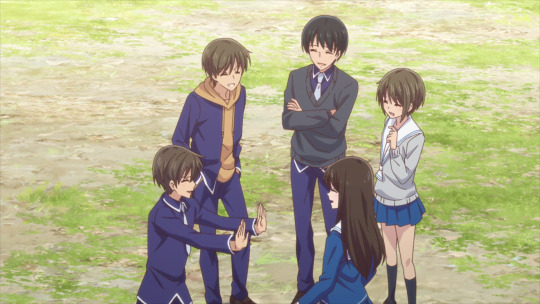
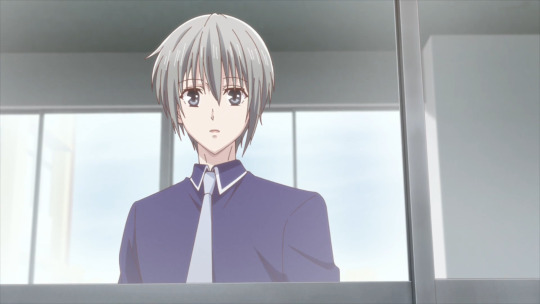

now that he isn’t self-loathing about his social anxiety, though, there is a part of his self-esteem that isn’t quite realized yet: viewing himself as someone worthy of befriending because of what he can offer.
this ties thematically with his offers of help being declined, but also with the climax of his character arc in season two -- he doesn’t want to just be someone who receives the benefits of being in a relationship, but someone who can give just as much back. while he was speaking about romantic relationships specifically, this extends to his closest friendships as well. we see him carry a lot of guilt over not being able to give as much back to people like tohru and haru, and is later revealed to be entirely unaware of what he offers in his friendship with kakeru, who considers his friendship with yuki to be the reason why he was able to grow into a better person.
he no longer contends with doubts that people want to be friends with him at all -- it’s been proven to him that people can see the real him and still want to be friends with him, even if he doesn’t necessarily like himself. his issue at this stage in his story is if he has anything to offer, as an individual, that would have others seek him out.
this ties back to his earlier insecurities revolving around kyo and kakeru, and even ties to how he views tohru -- these are people who seem to emit a warmth that others are naturally attracted to. he doesn’t believe the same is true for himself, and while it’s not a point of distress for him anymore, it’s not something he’s entirely grappled with. though he’s more secure in his close relationships with tohru, kakeru, and haru (versus how he felt about his role in these relationships earlier on), he does still wish to be a friend that is sought out specifically.
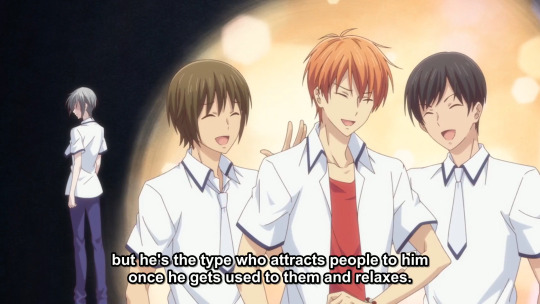

this scene where he finds himself alone, his help having been denied because of his dual role as the student council president and the school prince, and feeling somewhat like an outsider again as he observes a group of friends having fun, leaves him feeling acutely aware of this current dilemma he’s having. it’s only when machi runs into him, and tells him she’s been running around trying to find him just to say hello, that this insecurity is momentarily shattered for him.
[an aside: this issue is never fully addressed in the narrative. while it’s a natural progression in his journey through his social issues and self-esteem to understand how important he actually is in his relationships, the way that it’s concluded offers an awkward commentary on how he views his role in these relationships, which up until this point is the primary focus of his narrative. rather than going the route of becoming more secure in his relationships without needing overt confirmation that his friendship is beneficial, the story instead decides to go the route of him becoming so enamored with being sought out specifically -- by a girl who has no other relationships she feels she can confidently turn to, no less -- that he eventually conflates this with being romantically in love with her, and never returns to address this insecurity he still feels within his friendships. it’s a thread that’s lost in the midst of takaya wanting to wrap up his story with a romance that had very little foundation for the sake of having him have a “happy” ending, i.e. an ending with a romance, despite his narrative being about finding happiness in strong and trusting platonic relationships.]
machi is still a new friend to him at this point, and one that he’s been friendly towards since they started working together. while she’s only just started to warm up to him, his offers of friendship and general kindness towards her never hinged on whether he believed she would eventually become friends with him. he was kind to her for kindness’ sake, especially since she was someone who was otherwise intensely reserved, unsocial, and lonely.
this sounds like an obvious statement because yuki is, on the whole, a kind person, but again: he once believed that he only extended kindness in order to be liked in return. at the beginning of the series, he couldn’t differentiate between him lacking boundaries in order to be people-pleasing, and him being genuinely kind. now that he does understand his own boundaries (as a result of respecting himself more + healing his self-esteem), the kindness he extends is very much of his own unselfish volition.
that said, his kindness is something he acts on without consciously thinking of its benefits -- he doesn’t do kind things in order to receive something in return, or because he expects that his kindness is going to be the singular thing that helps someone. frankly put, he’s not arrogant. but this also means that when someone does overtly show that his kindness has had an effect on them, it catches him off-guard. (i say overtly because yuki’s kindness has had a deep effect on kakeru, too, but it’s very plainly stated that yuki doesn’t know this because kakeru never tells him directly.) machi chasing after him just to say hello isn’t just a sudden leap in their friendship, after she’s more or less appeared to not want to be emotionally involved with her place in the student council -- it’s a direct outcome of him consistently reaching out to her even when she didn’t react or respond. she’s seeking him out individually because he holds that same warmth that he was previously so wanting of.
and he has that warmth because he’s overtly, genuinely kind. that kindness that he previously thought of as being selfish is the benefit he’s doubtful that he possesses as a friend. the very thing that he thought he faked only to get other people to like him is the foundation for why others seek him out and love him -- because from the very start, his kindness has been real.
#fruits basket#yuki sohma#did someone order a uhhhhh big fuckin yuki essay#god i really do just love him sm just. yeah 💖#fruits basket spoilers#yunsoh meta
337 notes
·
View notes
Note
I honestly don’t see how you look at web and all his hobbies etc and see a non straight man.
How to say this gently, Anon...
Hobbies do not determine sexual orientation, nor do they express it. In fact, hobbies rarely have anything whatsoever to do with sexual orientation. Maybe if your hobby is having sex... 🤔
Do you think all gay men are into ballet and baking? Do you think all straight men are into logging and duck hunting?
Sexual orientation is not about what we like to do in our spare time, it's about who we are in love with and who we like to fuck.
The fact that DD is into skateboarding has zero relevance to who he is attracted to. Zero.
And that should be abundantly obvious. Learning to change the oil in your car or training in judo doesn't make you a lesbian. Being a straight woman doesn't automatically make you want to spend your life barefoot and pregnant.
What you are talking about is not sexual orientation, but rather traditional gender roles.
Look at the women around you and what they're into. Do you think that female mechanics, surgeons or firefighters must be gay as well? Of course not. We all (rightfully) champion women who break gender stereotypes and go into fields they love rather than traditionally 'feminine' fields. Only the most hateful people would ever call those women 'gay' for doing what they love to do.
Who people love has nothing to do with what kind of activities they enjoy.
Stereotypes are not just inaccurate, they're harmful
You might not be aware of it, Anon, but your comment reflects an extremely harmful (and offensive), toxic stereotype - not just about gay men, but about masculinity in general.
Women often complain about 'toxic masculinity'; about men being too macho, pushy and aggressive, and unable to deal with emotions. All of that is due to stereotypes that men are trying to live up to.
When you say or even think, "Real men are into motorcycles," you are artificially limiting what men are allowed to be into and still be thought of as men.
That's how you end up with all these straight male parents who are shit fathers who can't even change a diaper and refuse to do any housework. Men who won't ask for directions and who refuse to try yoga or wear pink. If a man admitting that he loves doing laundry leads to people essentially cutting his balls off, there's no way you're going to get that guy to do laundry. If a man who is sensitive and kind is no longer seen as a man, he's going to be a dick so he can keep his dick.
Masculine stereotypes are a massive problem in the gay community. Gay men are constantly having their masculinity questioned/threatened, which has led to an obsession with having the perfect muscled body, has led to major ongoing self esteem issues in men, and has led to ostracization of effeminate men in the gay community. Effeminate gay men are often treated nearly as badly in the gay community as they are in the straight community.
That's a big part of why your assertion that DD must be straight because of his hobbies is so completely ridiculous. Gay men are very often as macho and manly as straight men, in part because we have something to compensate for. We have to push back against the emasculating attitude people have toward us as gay men.
This man is very gay:

This man is straight:

This football player is gay:

This figure skater is straight:

Anon, I know you probably don't mean to be offensive, but your attitude reflects a very poor understanding of sexual orientation - one that harms gay people. Gender roles and expectations have nothing to do with who we love or are attracted to. They are two completely separate things. Gay stereotypes are actually very homophobic and harmful.
Fear of having our gender identity erased if we're queer is often what leads people to stay in the closet, or to repress our sexual orientation completely. It leads some gay men to attack other gay men who have more effeminate or androgynous traits. It leads to widespread excessive dieting, anorexia, over-exercising and body image issues among gay men. It leads to self loathing, depression - even suicide.
So I hope that you'll do some reflecting on this, explore these issues more deeply and educate yourself. Not only so that you will stop thinking harmful things about gay people, but also so that you can liberate yourself from gender stereotypes and gender role expectations in your own life, and feel free to express yourself more broadly.
It's interesting, because this is one of the first questions I was asked when I started this blog over a year ago. I guess it's still an issue in the fandom...
EDIT: Please do not pile on Anon in the comments or via my inbox. Not everyone has equal access to reliable, accurate sex education. Let's try to be charitable and understanding.
140 notes
·
View notes
Text
The Kaiser wasn’t very good at being a villain (and that’s the point, actually)
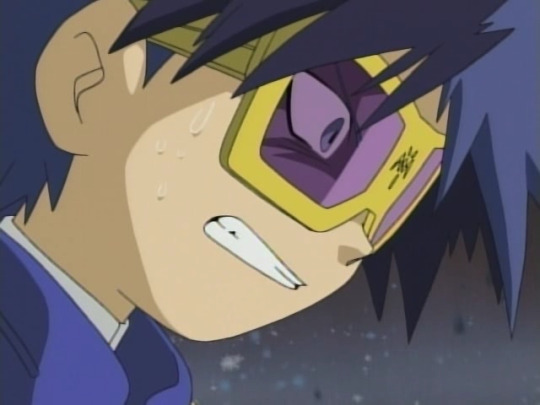
Ken’s journey of redemption is generally well-documented overall, and it was explicit enough in the series that there’s only so much you really need to explain it, but due to the blurred boundary of what was supernatural influence from the Dark Seed and what was Ken’s own emotional problems wreaking havoc, it’s somewhat more difficult to bridge that gap between the Kaiser and Ken, and how they can be the same person.
The easiest way to understand it comes from both directions. One is that Ken, even in his normal element, is much more assertive than he’s often given credit for -- it’s just that the Kaiser is a (fragile) manifestation of that very carefully cultivated to channel that in all of the wrong directions. The other has to do with the fact that the Kaiser is actually really terrible at being a villain, and the persona itself is very fragile and difficult for him to maintain.
Rewatching the first half of 02 shows multiple indications that, for all he seemed to be the stereotype “evil genius”, Ken was forcing himself into the mold. He was never cut out for it from day one. Even from the beginning, Ken’s actual nature as a lonely and inherently kind eleven-year-old child was tearing apart at the Kaiser persona, and the fateful episode 21 was not so much a single turning point for him as much as it was the last straw in a series of things tumbling down for him.
Before we continue: While all of the meta on this blog is only possible thanks to support and input from a handful of friends (whose names will not be disclosed on account of privacy requests), this one in particular arose from a long and extensive discussion with said friends that I am extremely grateful for. As always, I hope I was able to convey your points well.
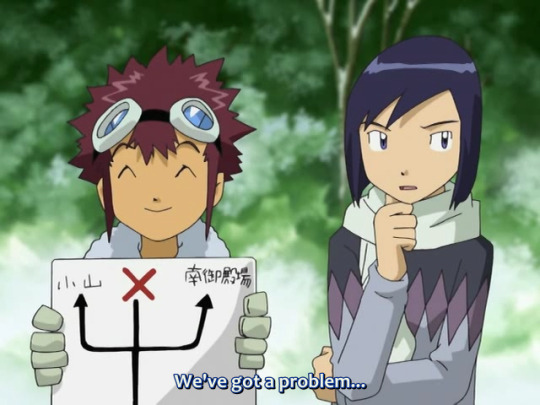
Well, firstly, it’s important to understand that, much like nearly any other character in this series, Ken’s surface demeanor is a bit deceptive. The Crest of Kindness has the original Japanese name of yasashisa (優しさ), which has a secondary meaning of “gentleness” (lost in translation, but still apparent with the bubble metaphor in 02 episode 23). That also ties into the secondary meaning of “kind” -- it’s not just about being naturally “soft”, but actively choosing to be gentle with others even when you’re theoretically capable of not doing so. (For those of you who have seen Appmon, the entire point of that series was about what it means to consciously and deliberately choose to be kind, and, in fact, quite a few parallels could be made between Ken and Haru...)
The contrast between Daisuke and Ken goes far beyond just the surface. Daisuke’s surface demeanor is abrasive, but he’s not actually very good at being assertive until push comes to shove, and he otherwise tends to bend easily to others or get overwhelmed; in contrast, Ken has a more polite demeanor and for the most part seems non-confrontational, but has much stronger control of his emotions and is more easily able to be assertive than Daisuke is. (Of course, both of them share the common point of being like-minded when it’s something that really matters, but Ken is much better at imposing his will and getting what he wants done before Daisuke ever gets to that point, which is what fuels the whole punchline of Daisuke and Ken’s Shopping Carol.)
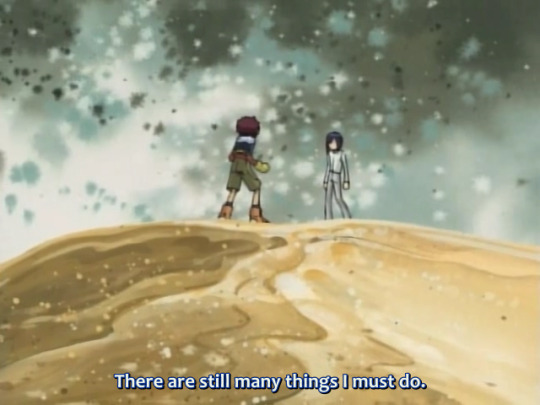
So, the point is: Daisuke is kind out of instinct and just “naturally” being so, but Ken is kind because he consciously believes in treating others well and not causing conflict, and not causing pain to others.
That’s not to say that Ken’s behavior is out of suppression or anything! It’s not a case like Takeru, who’s trying to push complicated emotions down while pretending they’re not boiling under the surface, nor is he like Hikari, who’s compulsively pressing her emotions down out of a desire not to burden others. Rather, even as early as 02 episode 26, he’s very straightforward about what his issue is and what he thinks about it. Ken’s “shyness” during the latter half of 02 is largely due to shame and hesitation from not knowing the other 02 kids well, but as the series goes on and as we go into post-02 material, he indicates that he’s perfectly wiling to be vocal about what he thinks without necessarily fighting any compulsion to suppress it. For someone who claims he doesn’t know much about his own heart, he arguably seems to have the best grip on understanding himself compared to a lot of this cast!
So in essence, the main take-home here is that Ken is theoretically capable of being strong-willed and assertive, and is very good at choosing when he wants to be assertive and when he wants to hold back. And he likes seeing people get along, and he wants everyone to be happy, and he doesn’t like seeing people be hurt or hurting others, and under normal circumstances, Ken has very good control of his emotions for the most part and quite a lot of self-awareness. That’s why Ken is the one to get the unique designation of this Crest; everyone in this cast can be said to be generous and supportive of others in some form, but there’s a difference between being a “natural” doormat who defers to others by default (Daisuke being a very good indicator of how this kind of mentality has a flip side of lack of self-esteem and high insecurity, and Tamers’s Takato being a good indication of how “being deferential” doesn’t necessarily preclude you from having tendencies towards selfishness or cowardice), versus choosing to be kind by understanding everything and still being gentle out of a belief that it’s the right thing to do (again: see Shinkai Haru). And it’s why Wormmon says in the 02 episode 23 flashback that Ken’s kindness can be used against him; being “kind” in this way requires a lot of mental fortitude, strength, and guts, all of which are things that could easily be very bad things when applied in the wrong direction.
This means that all the Dark Seed really needed to do in order to turn him into the Kaiser...was make him lose grip on that self-control.
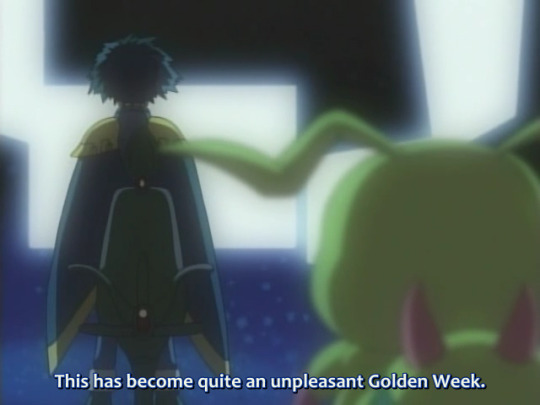
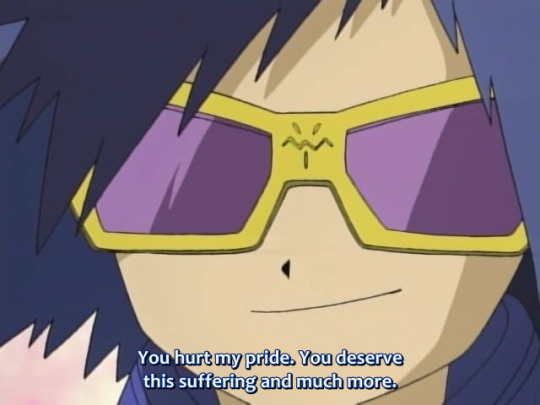
Actually, Ken says it himself in less-than-subtle words in Spring 2003:
…It was revenge. But who was this revenge against? Did I want to triumph over the ones who made fun of me? The ones who looked down on me and used me?
But… In the end, it was revenge against myself. I couldn’t do anything but deny the kind of human being that I was.
So in other words, the Kaiser persona was, effectively, a self-loathing eleven-year-old boy throwing a massive tantrum. A lot of the Kaiser’s actions in the first half of 02 are honestly rather petty -- he’s basically upset at the kids spoiling his holiday in 02 episode 6, he attempts torturing Daisuke out of a petty grudge over a soccer sliding tackle in 02 episode 8, and everything to do with expanding his territory and eventually (hopefully?) becoming ruler of the Digital World is frankly very sloppy. For all he’s said to be a genius, his genius only seems to extend to book smarts, and his “tactical planning abilities” never really expand beyond that of a soccer field sort of affair; his way of locking down control on other things is basically just “brainwash it harder” or “whip it harder” and applying harder brute force instead of doing something in the long-term like, say, trying to rule with charisma and recruiting allies.
(Again, bringing Appmon back into this, seeing Cloud in action will give you a much better example of a charismatic human villain who’s actually competent at his job. Or, heck, you can even look back at Savers’s Kurata, who at least was savvy enough to pull strings with people in powerful positions. Or even the Kaiser’s predecessor Saiba Neo from V-Tamer, who may have been openly sadistic but still had the sense to align himself with background power. Really, compared to all of these folks, the Kaiser is downright pathetic.)
Remembering that Ken fell into the Kaiser persona partially as a desperate attempt to become a “perfect person” like Osamu, Ken “imitated” Osamu’s cruelty to him because he felt that was how he could improve himself to become a “strong” person better than him. But the irony here is that Osamu’s “cruelty” was something that he himself never liked, and mainly came from lashing out at Ken due to feeling like he had a lack of control over his own life. So Osamu was never happy in that position, and Ken, who is indirectly pointed out via the bubble metaphor to be even more fundamentally inclined towards gentleness, is probably even more miserable.
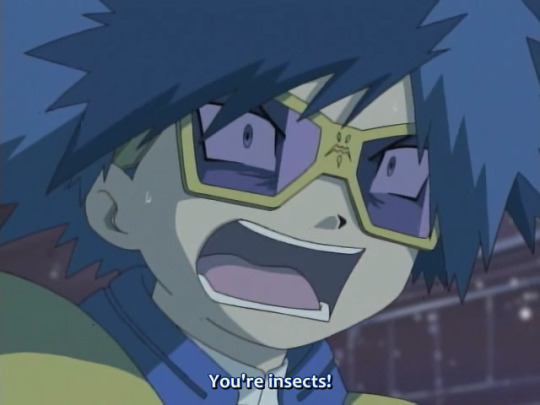
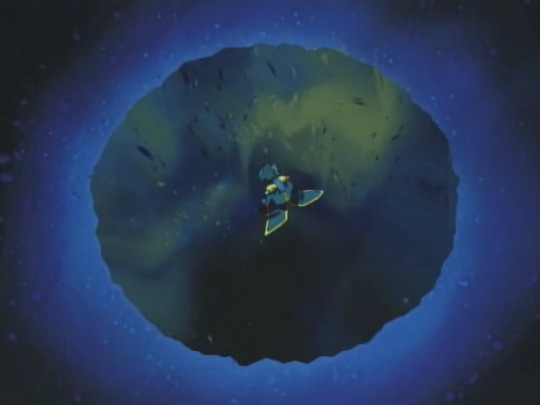
Because everything Ken does as the Kaiser is “unfocused lashing out at everyone”, the Kaiser has less control over his emotions than Ken normally would. Takeru manages to emotionally pin him to a corner by confronting him with enough assertion in 02 episode 19 (this is before he punches him), and correctly points out that the Kaiser isn’t capable of winning with words (i.e. ideologically) and resorts to violence as the first thing he can think of. You’d think that if the Kaiser were actually someone with the self-confidence to consider the other Chosen Children beneath him, he wouldn’t even bother giving them the time of day, but Takeru just happening to be a little assertive is enough to make him lose his composure and start falling apart, and a lot of his shaken “insects!” yelling comes from him seeming pretty desperate to cling onto that rather than being all that confident about his natural superiority over anyone. 02 episode 20 establishes that he’s getting himself in over his head by tampering with the powers of darkness he can’t control, and while, on a plot level, it means that he’s misjudged his own capabilities, on a metaphorical level, it corresponds to the fact that even Ken himself is incapable of getting himself out of the emotional abyss he’s in.
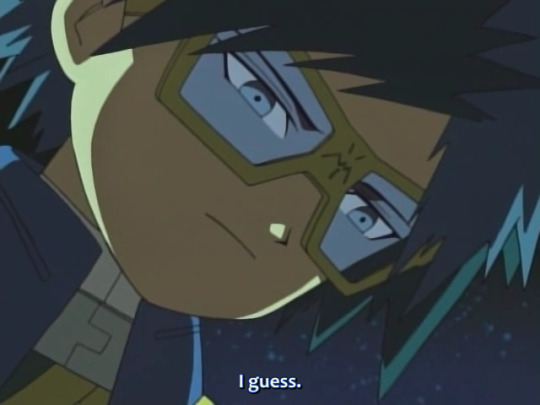
And on the flip side, one of the biggest “tells” that Ken is still miserable during all of this is 02 episode 9, where he’s seen ruminating on the “glory” he’s getting in the real world despite having just decided to leave it all behind. The episode prior, after all, had been called “The Digimon Kaiser’s Loneliness”. The media is using him like some kind of “hot topic”, his parents’ affection (in his mind) is shallow and based only on his achievements, and he has no friends (how much of a role Akiyama Ryou played in his childhood is unclear, but either way, he’s no longer around now). With no emotional support coming from any direction in the real world, he’s resorting to at least trying to have some “fun” in what he perceives to be a “game”, and yet he’s still not having fun at all.
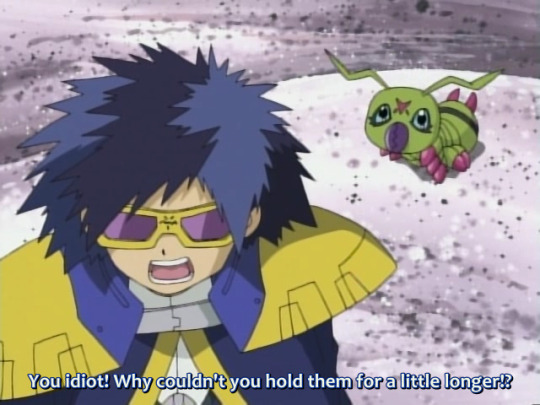
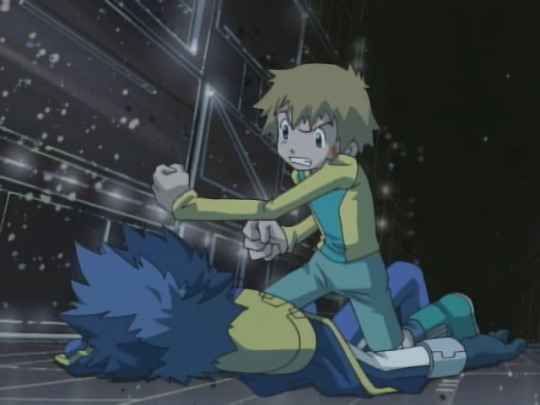
If you look carefully at a lot of the Kaiser’s actions during the first half of the series, one thing you’ll notice is that there are multiple indications that he’s not quite up to par to being as sadistic as you’d think he’d be. Recalling that we learn in 02 episodes 20-21 that the Kaiser is under the impression that the Digital World is like a game that he can “reset” and the Digimon in it not real living beings, it has interesting implications of the fact that he’s actually very hesitant to physically harm other human beings -- he certainly likes emotionally toying with them, but even when he’s trying to take petty revenge on Daisuke in 02 episode 8, he goes out of his way to set up a trap with Bakemon to torture him rather than, well, actually using the kids as hostages. That’s a hell of a lot of work to do, but he instead uses this extremely roundabout way to get them out of the picture in a somewhat less harmful way, risking having them escape (which is exactly what happens).
And in 02 episode 19, when Takeru confronts him and he ends up whipping him, you can hear a slight “...gh?” in the Japanese audio for a split second right after that, meaning that the Kaiser is, for some reason, having a hard time dealing with the fact that he just hit Takeru, and he does a very poor job defending himself against Takeru punching him out despite ostensibly being trained in judo. (Seriously, if you watch the animation of the scene, he’s just lying there while Takeru repeatedly punches the hell out of him, because he’s so out of it.) Regarding the Digimon, he’s convinced himself that they’re not living beings, but regarding the human Chosen Children, who undeniably are, no matter how much he might look down on them, he has a suspiciously hard time harming them as much as he could...
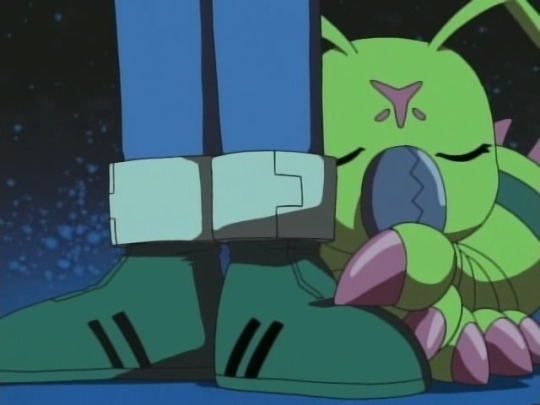
On top of that, one interesting question that might come up to one rewatching the first half of 02 is the strange “contradiction” of why the Kaiser ostensibly seems to hate Wormmon so much, calling him an unworthy idea of a partner in 02 episodes 10 and 19, and yet does remarkably little to get Wormmon away from him or off his case (he hates Wormmon calling him “Ken-chan”, yet doesn’t really try very hard to stop him). He could have easily locked Wormmon away in a cage or something if he really wanted to -- actually, there’s the question, why doesn’t he slap an Evil Ring on him? Because in the end, Wormmon is the only emotional support he’s really getting, and so it’s likely he unconsciously doesn’t want to lose that. Recalling that Digimon are fundamentally linked to the inner self, the Kaiser rejecting Wormmon for being “weak” is analogous to Ken rejecting his own self for being “weak” and “not perfect” -- which means that the fact he still keeps Wormmon around is analogous to the fact that Ken hasn’t really been able to bring himself to completely let his fundamental nature go. And, hence, it’s why he gets so initially incensed at Wormmon’s “betrayal” at 02 episode 10 (and yet still keeps him around despite that), and is ultimately emotionally destroyed by his death in 02 episode 21.
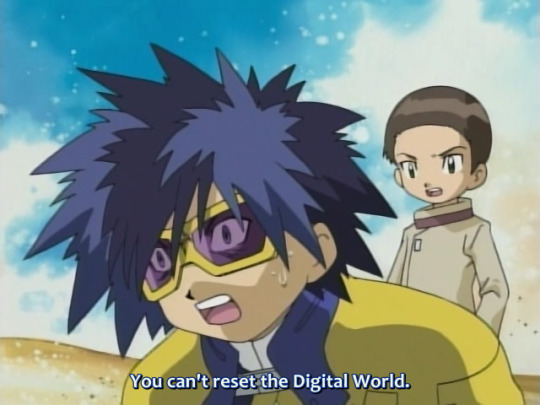
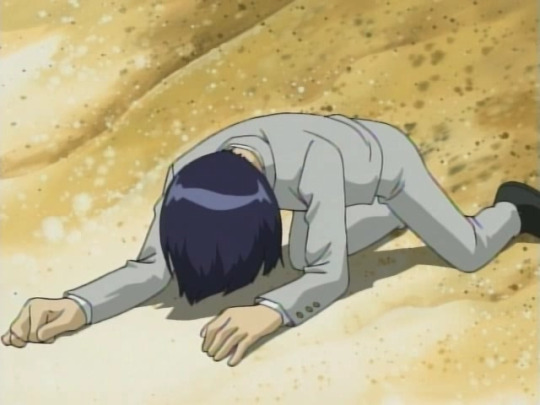
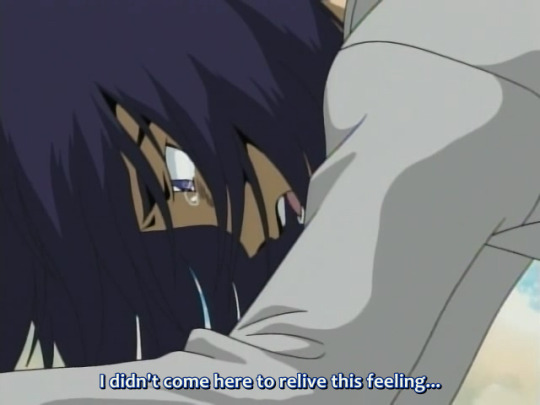
Although, actually, if you look carefully at 02 episode 21, it’s not quite Wormmon’s death that necessarily does it -- the turning point where he sheds the Kaiser persona is right before that (and in case you have any doubts, the animation puts highlights in his eyes for the first time in the series right at that point). Wormmon’s death is the first major consequence of his actions that he has to deal with, but what actually brought Ken back to his senses was his own realization that Digimon are living beings, that his actions have had permanent effects this whole time, and that he can’t take back anything he’d done.
Remember that 02 is a series that is largely about moving on and accepting that you can’t change the past, and that you have to move forward regardless of that. Ken’s fall into sadism was only possible by driving him into extremely deep-seated denial -- he was already starting to face the potential reality of Digimon being real, existing beings in the real world an episode prior. He says, outright, in 02 episode 21, that part of the reason he came to the Digital World to do all of this was escapism -- and, presumably, under the idea that any mistake he made could be rolled back and redone, unlike Osamu’s death. But the Digital World is not a place you can reset like a game, Ken will have to live with the consequences of his actions again, and moreover, every single one of the actions he’d been convincing himself were relatively meaningless had caused severe and permanent harm, and the entire thing overwhelms him.
It’s also important to point out that this was probably where the Dark Seed had to work a lot of magic to get Ken to embrace this kind of denial so easily -- after all, it’s established in the final quarter of the series that it does have a tangible impact on personality and puts a damper on one’s ability to feel empathy. In the flashback in 02 episode 23, regardless of whether Ken considered the Digital World to be a “game” or “able to be reversed” or not, he clearly still didn’t care and treated those around him with proper kindness (even if he did consider it to be all of that, it probably wouldn’t have been entirely unlike how a lot of us have a hard time picking rude choices in video games). It’s a very complicated chain reaction of events that allowed this to be even possible, and it was so against his fundamental nature that once the denial broke and Ken reached his limit, he wasn’t able to do it anymore. The Chosen Children’s main role in 02 episode 21 was really just cleaning up the massive mess he’d made in the form of Chimeramon, but as far as the whole thing about the Kaiser’s persona completely falling apart and Ken being forced to confront his own self goes, that was pretty much all Ken and Wormmon, in a series of dominoes that had already been collapsing for episodes on end.
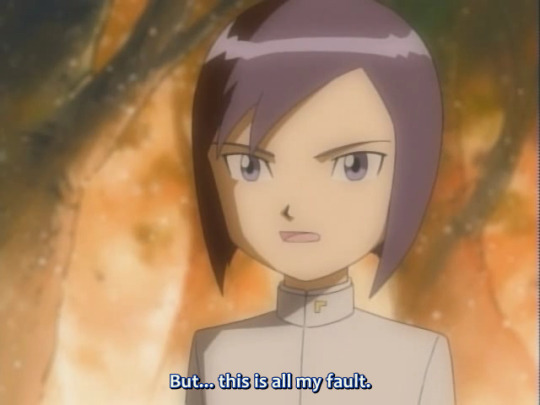
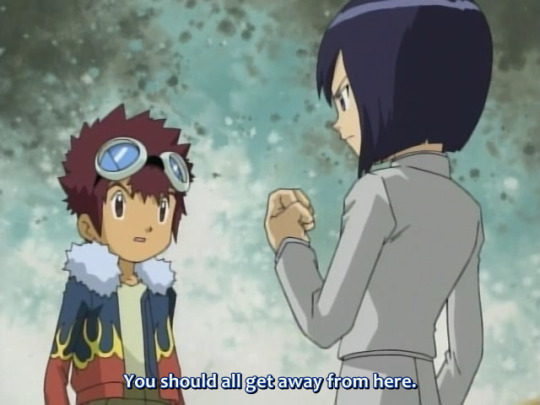
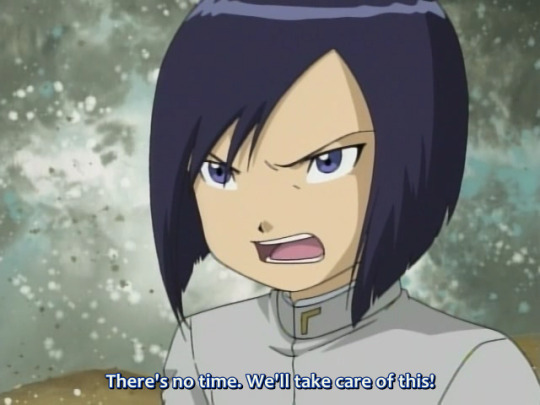
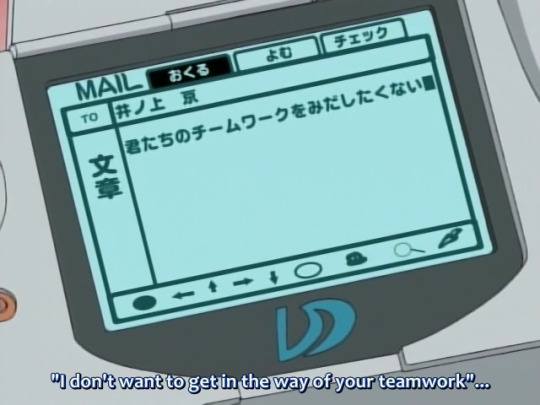
The following episodes have Ken treat the 02 team with a certain amount of detachment, and this is often construed by a handful of people as being reflective of Ken being standoffish of some sort. The fact that Daisuke and Ken are often promoted in franchise materials as “rivals” mainly due to them being in the “protagonist and right-hand-man” position such characters are in might tempt you to think that way, but they are most definitely not!! (Considering that even saying that Taichi and Yamato fit that mold is a bit questionable, and neither Ruki nor Jian quite fulfill the expectations of the role in regards to the genre-subverting Tamers, Frontier, which is explicitly said to be deliberately written to be conventional, is probably the first proper execution of this trope in the form of Takuya and Kouji.) Ken’s detachment from the group at this time in the series is something he actually gives the reason for quite directly: he believes it’s his fault and doesn’t want to burden them with what he considers to be his job, and in the end Daisuke ultimately breaks through to him and they become completely normal friends who get along. “Rival” what?
Ken is, at worst, distant during this point of the series, but he’s actually very straightforward about what he wants and intends to do; it’s just that he’s being a bit blunt about it because he’s still drowning in his shame and not sure how to approach them. (Also, consider the fact he was rather lacking in friends or a support group before all of this; he doesn’t have a lot of experience in socializing, either.) So he keeps everyone at arm’s length, and the reason he comes off as so standoffish is because he’s so assertive! He directly and bluntly makes some very strong remarks about how he believes everyone else shouldn’t be getting involved! Again, when left to his own devices and not being manipulated into by a supernatural evil seed into multiple levels of denial, Ken is very in control of what he wants and thinks, and is even very open about speaking his mind.
That’s even when they’re not good decisions, mind you. Ken starts off the climax of 02 episode 26 being very firm about wanting to suicidally throw himself into the reactor in order to stop it, and 02 episode 30 has him consider himself a burden to the team after the fallout with Iori and try to stay out of it despite them very badly needing his presence, which Daisuke (of all people!) rightfully calls him out for being childish about. But he also listens to reason very quickly and acknowledges the others’ point very easily, with Daisuke reminding him in 02 episode 26 that his suicidal recklessness is actually pretty self-centered and short-sighted of him, since it’ll prevent him from doing anything else to take responsibility for his actions going forward, and Miyako, uh, slapping him in 02 episode 30. (But he comes quietly right away as if acknowledging his own idiocy, and never holds it against her thereafter.)
Nevertheless, the point is: you can see that this kind of assertiveness is the same kind of assertiveness he had as the Kaiser, just channeled in a different direction and for a different purpose. But as the Kaiser, he was angrily lashing out at anything and everything and stepping on anything he could just so he could have a show of power; once he comes back to his senses, he reserves that force for it being something he consciously believes is the right thing to do (regardless of whether it’s actually the right thing to do or not).
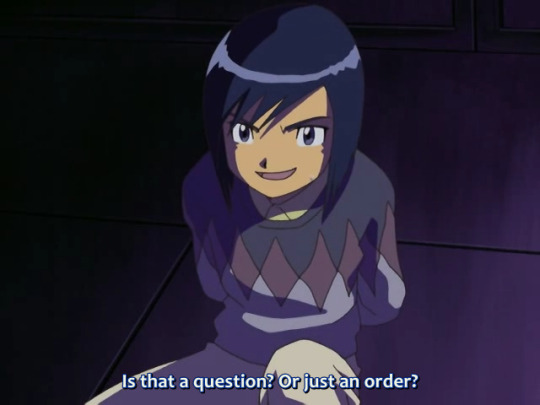
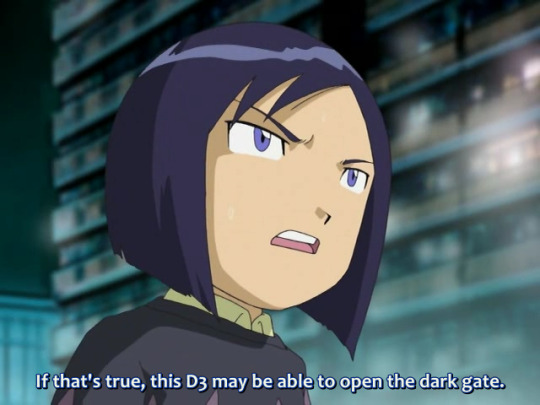
Because of the fact Ken spends a lot of the last quarter of 02 suffering and parsing a lot of trauma, a lot of people have tended to pin him as constantly sad and being a soft crybaby, but that couldn’t be further from the truth! Despite all the emotional pain he goes through, Ken has a hell of a ton of strength through all of this -- he even flings a well-aimed quip at Oikawa in 02 episode 44 despite being in a completely helpless situation, and in 02 episode 45 he himself is the one who volunteers to open the gate to the Dark Ocean, despite knowing exactly what it entails. That takes a lot of guts, and all things considered, his recovery from being the Kaiser spans only four months and is altogether incredibly fast given what he went through -- it did not take long for him to regain his bearings and get himself back on track. Again, it’s the same kind of “assertiveness” and capacity for action that fuels what the Kaiser did, just better controlled and in a direction Ken knows he actually wants.
This is also why I tend to object to insinuations that Ken would be overly touchy about or traumatized by the mere discussion of him being the Kaiser in the aftermath of 02, because the series itself, multiple times, portrayed him as being very able to talk about his experiences bluntly and honestly, at worst maybe considering it a bit of an awkward topic. He has no problems admitting that it was a thing that happened, especially if it involves discussing it as part of taking responsibility or preventing further damage -- it’s just that he of course doesn’t enjoy it either, and is equally as open about the shame he feels as a result. All of the times Ken loses his composure in the latter half of 02 involve either physical pain being inflicted on him, or a lot more actively vicious invocation of his memories and insecurities, and even then he gets himself back on his feet with a rather prompt amount of speed. Poorly timed of a statement as it may have been, Miyako is not incorrect when she says in 02 episode 31 that he has a certain amount of natural resilience that he carried from being the Kaiser.
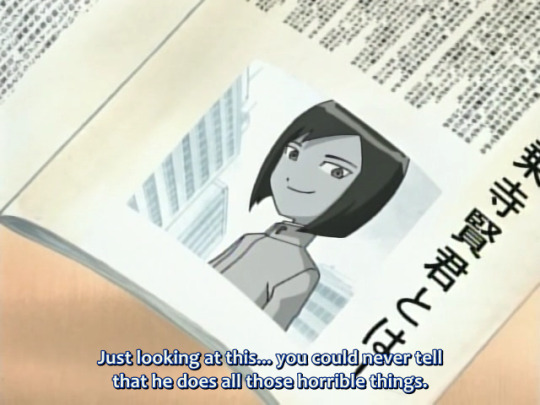
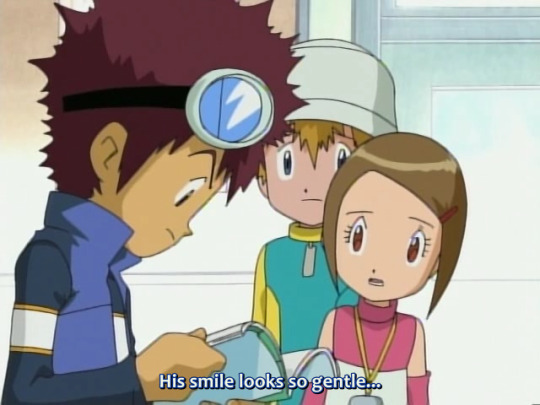
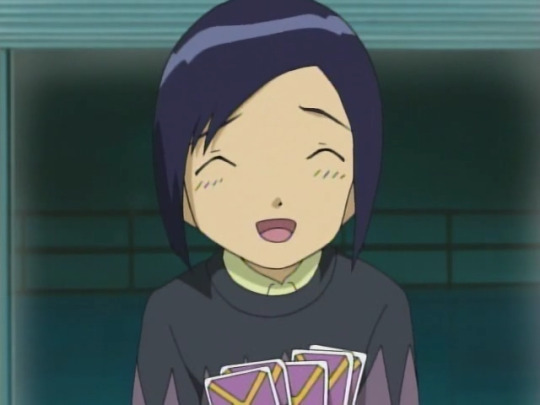
All the way back in 02 episode 9, shortly after it was revealed to the group that Ken was the Kaiser, Iori, Hikari, and Takeru all label Ken as someone who doesn’t look like someone who could do something so horrible, and Hikari even says that his smile looks “gentle” (note that this is yasashisou, a word derived from the same root word used for his Crest). So in other words, even all three of them were able to catch on to his actual nature betraying himself even during that awful period of time. It’s still poking through, all things considered.
But we as the audience know he’s putting on that face for the camera, and his eyes are still as dead-eyed as they are for the first half of the series, and when Miyako accidentally makes him laugh during the Christmas party in 02 episode 38, it’s very much framed as probably the first time Ken has been this genuinely happy in a long while. He was never able to be this happy even when “satisfying” himself by stepping on others as the Kaiser.
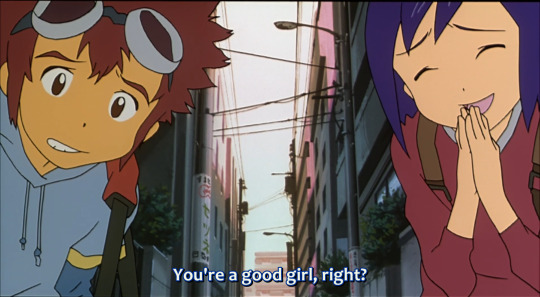

And that’s why it’s so extremely unlikely that Ken will ever be able to lapse back into the Kaiser persona after the events of 02, even with the Dark Seed technically still inside his neck. He wasn’t enjoying it anyway; the Kaiser persona wasn’t a habit that he fell into out of emotional suppression or even catharsis, but rather him forcing himself into a role he was never comfortable in to begin with. He was never truly satisfied with anything he was getting out of it, and moreover, it took the combination of supernatural influence and a hell of a lot of denial to allow it to get that far in the first place, because of how far against his fundamental nature that was. (Again, for those of you who have seen Appmon: think about what it would take to get Haru to embrace sadism.) Even Osamu wasn’t enjoying being cold; being kind and living your life with positivity is a lot more fulfilling and fun, anyway.
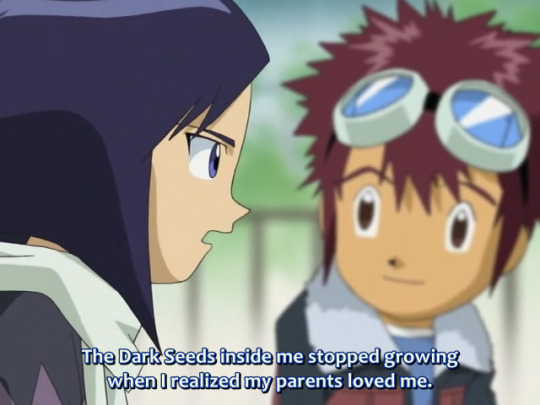
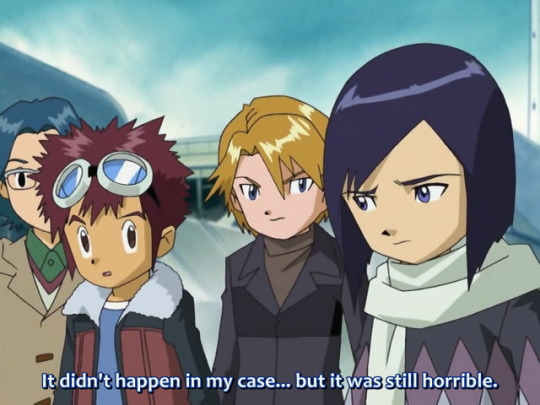

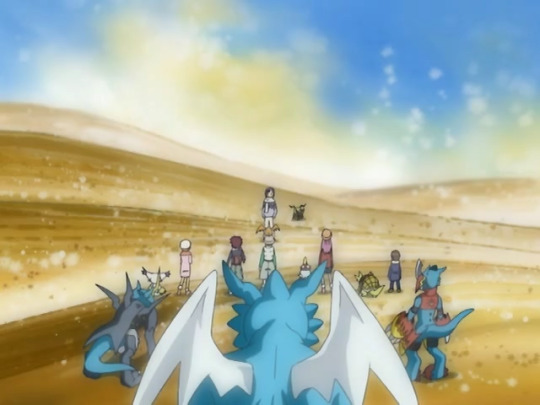
In 02 episode 48, Ken describes the influence of the Seed as “horrible” in retrospect; even if it didn’t involve physical pain and exhaustion the way it did for the Dark Seed children, the entire experience sucked even back then. And while Ken theorizes about the Dark Seed’s influence being countered by the power of love earlier in the episode, when you look at the whole of 02, it’s not just his family’s love -- Ken now has the emotional support of his family, and Wormmon, and his newfound friends, and that’s giving him all of the fulfillment he wanted that putting on a front of sadism wasn’t giving him, and he doesn’t really need anything else anymore.
02 itself is very much about the fact that it’s not a bad thing to rely on the support of others to be happy; the Ken and Kaiser are undoubtedly the same person, but the latter’s existence requires a very specific lineup of events and factors to happen, and one of the massive parts behind that was a severe lack of emotional support or anyone who properly understood him. And by the end of the series, Ken has more than enough strength of heart to accept everything that’s happened and move on, and to stop reaching out to denial and clinging onto the past, and he has emotional support and understanding from a whole new group of friends that thoroughly understand everything he did and went through, and wholeheartedly accept and love him anyway.
He is never going to have a gaping hole in his life like that again.
167 notes
·
View notes
Note
Do you have any thoughts on Marty and his self esteem issues? In most of the trilogy, I feel like Marty ranges from experience a lot of insecurity at best, to like a considerable amount of self loathing at worst, (like pls Marty, Doc getting struck by lighting was not your fault? You’re not Thor?) . And there’s the whole chicken thing, so I was curious if you had any thoughts on where it stems from, how it’s affected him etc etc? Okay lmao that’s it, have a great day !!
Hello! Do I have thoughts?? Yes. I do.
So, one of the things I like so much about Marty as a character is that...he's kind of an enigma of sorts? Like. Here's this kid who skateboards, rocks that denim jacket and the cool sunglasses, plays guitar, has a pretty girlfriend, etc. You take all of that, and it should reflect a really confident, popular person. I mean, with all the stereotypical "cool guy" attributes considered, Marty should have Ferris Bueller-level confidence and charm. He should be strutting around, smooth-talking everyone, laughing in the face of danger, and possessing unshakeable self-esteem. But he does/has none of those things because, as we all know, Marty is A Mess (affectionate). And yeah, a lot of it seems to stem from self-esteem issues, which we do see sprinkled throughout the trilogy. Where's it all coming from? Well, a lot of places, most likely...
• FAMILY: Probably the biggest factor. Though I'm sure George and Lorraine were sincerely in love for a while at the beginning of their relationship/marriage, I think it's fair to assume that any real spark between them had pretty much fizzled out by the time Marty came along or when he was a young kid. Take a loveless relationship between a meek, subservient man and a woman who drinks away her feelings, factor in a 17-year-old boy who's probably never had any real semblance of parental stability in his house, and it's highly likely that kid is going to have some issues. It's really difficult to believe in yourself & feel secure when the norm is having parents who are wrapped up in their own worlds/rarely interact with each other, seeing your father get emotionally (& physically!) pushed around by his supervisor, and watching your mom cling to alcohol and sink into depression.
• Plus, there are the separate relationships George and Lorraine have with Marty. Granted, we don't see much of it, but what we see at dinner is probably a good example of a typical interaction. George is quick to steer Marty away from any situation where he may face rejection or hardship. And yeah, he may think he's protecting his son, but this strategy is actually pretty harmful. I can imagine that any time Marty is feeling nervous or let down, and goes to his father seeking encouragement, he's only left with the impression that it's better not to take any risks at all because he might fail anyway. Instead of being built up, any potential self-worth is being chipped away at by George.
And as far as Lorraine is concerned, I get the impression that she's (more often than not) critical and judgemental of Marty. She's not shy about airing her strong dislike for Jennifer, during which Marty stays completely silent and unresponsive. Perhaps Marty's general default around his mom is silence, due to him having learned a long while back that he's better off keeping his mouth shut. I can see Lorraine lecturing Marty often, picking apart every little flaw she may see in him (friends, grades, attitude, etc.), especially when she's had too many drinks and especially when you consider that Marty is probably her most "difficult" child. Sad as it may sound, I can't picture Marty walking away from very many interactions with his mother feeling good about himself.
• GENERAL ANXIETY/NEURODIVERGENCY: Marty is an easily flustered, anxious guy. And whether that stems from his home environment or genetics (I mean, look at George), I don't know. But he definitely seems to be a sort of nervous, hesitant kid, particularly in the first movie. I also, like most of the fandom, headcanon Marty as having ADHD. And like...if that's the case for him, it certainly isn't helping at all with the self-esteem stuff. He's written off as a slacker at school, told he'll never amount to anything, and probably struggles a lot to keep up in his classes and survive in an environment that almost definitely doesn't offer any form of support or accommodations. That would be a big blow to his self-worth as well.
People with ADHD also tend to be very critical of themselves, worry about what others think of them, and have a hard time with rejection. Hence, the one rejection at the audition followed by, I'm just a big, stupid failure and I'll never ever be good enough. My world is crumbling, I should just give up everything forever =(((
(What do you mean those weren't his exact words??)
• BONUS: Marty might also face a decent amount of social isolation/teasing due to his friendship with Doc, which would take a toll on confidence too. Also, I just...don't think that Marty has many friends??
When you take all the above factors, Marty's self-esteem issues make a lot of sense and, if not for Doc, would probably run a lot deeper than what we see in the trilogy. ALSO!
• Marty blaming himself for Doc getting hit by lightning in the DeLorean: I've seen a few people comment on this and how they think it's ridiculous that Marty felt guilty but...it's always made a lot of sense to me, actually. No, Marty didn't cause the lightning, but he did set off the chain of events that led to Doc being there at that moment. If he'd had the inner strength/self-control to walk away from Biff outside of the dance, he could have just joined Doc on the roof with the almanac and they'd have been on their merry way. And even if Biff had continued to challenge him, or even followed him, Marty likely could have created a diversion or gotten an adult at the dance to help and still made it up to the roof before the worst of the storm hit. But because he couldn't stand being called a chicken, he ended up taking a door to the face, had the book stolen back, and had to go on that little side adventure to retrieve it, which led to Doc needing to save him. So yeah, I'm actually team Marty on this one. His choice did lead to Doc being catapulted into the Old West, lol. I'd have been consumed with guilt too.
• The Chicken Thing: I'm not going to go into too much detail (HA!) because this is already ridiculously long, but I will say that I don't go by the more popular headcanon that says Marty's sudden inability to handle being challenged is due to the updated timeline taking effect and "altering" him. Essentially, that Marty growing up with a confident, successful father made him have higher expectations put on him, and so he was always striving to prove he could live up to them.
I actually don't think any ripples from the new timeline catch up to Marty yet during the course of the trilogy. (I tend to headcanon that as happening gradually in the coming weeks and months after he gets home). Instead, I think that Marty's inclination towards becoming feral at the words "chicken", "yellow", etc. is because of his life in his original timeline. Growing up with a jellyfish for a father, it makes sense that Marty would want to distance himself as much as possible from being associated with weakness. He'd want to prove himself that much more because everyone around him would probably think he's just like his cowardly old man.
And though I know it's not really possible (because they weren't planning on a 2nd or 3rd movie), I think a case can be made that there's a glimpse of the "chicken thing" in the first movie, in the scene of Marty and Lorraine in the car at the dance. I mean, he gets all upset and tells her not to drink, but then she calls him a square, uses the classic peer-pressure tactic of, everyone's doing it, and he caves instantly and takes a swig. Could be because he doesn't want to be thought of as a square, or could be because he's desperate to calm his nerves a bit. Either way, Marty doesn't seem to fare too well when challenged or put under pressure, so I lump this scene in as a "chicken" moment.
I...need to stop. I set out to write a quick response to this. Like, a paragraph or two. But this question activated Hyperfocus Mode, and I blinked and now it's 2 hours after I started and I have AN ESSAY.
Thanks for the ask! *goes to lie down*
#back to the future#bttf#marty mcfly#asks#nikki rambles#nikki be quiet challenge#🤐#though...at this point you all know what you're getting into when you ask my thoughts or analysis#so I suppose you want responses like this??#idk i'm always a little worried i'm going on too much and am annoying everybody#so i hid it under a cut so you can scroll past if you want lol
72 notes
·
View notes
Link
How Self-Esteem Develops
We are not born already being able to accurately assess the world and ourselves. Self-reflection is something a child starts developing as they become self-aware and develop a stronger sense of self.
In order for a child to develop a healthy and accurate self-esteem, they need mirroring, attunement, and validation from the caregiver. If the child doesn‘t get enough of it, their ability to self-assess is stunted or even damaged.
A big factor in the development of our self-esteem is the fact that as children we are dependent on our caregivers. By the nature of it, our early self-perception is mostly shaped by how we are seen by our primary caregivers and other authority figures. We internalize other people‘s perception of us and eventually it becomes our self-image.
All of this means that if our early environment provides a skewed perception of us, we develop a skewed self-esteem. This impacts our lives as the issues that stem from it follow us into our adulthoods and sometimes last a lifetime.
These issues manifest themselves on many levels: intellectual (false beliefs, magical thinking, unrealistic standards), emotional (depression, chronic shame and guilt), or behavioral (addiction, self-loathing or destructive behavior).
Below, we will explore five common self-esteem issues people have. Some of them you may notice in yourself while others may apply to people you know or have observed.
1. Never Feeling Good Enough
A lot of people grow up feeling that they are not good enough. If as children we are treated unfairly, like we are worthless or not good enough, then we may grow up believing that we are never enough.
Often such a belief stems from being held to unrealistic standards (perfectionism), being compared to others, and generally mistreated.
Growing up with such a mindset leads us to believe that whatever we are doing is not good enough, that we always have to do more, that we can never relax, and many other false thoughts.
2. Self-Erasure
Many people are raised to take care of others and undermine their own needs, wants, preferences, emotions, and goals. Many caregivers wittingly or unwittingly see their child as someone who supposed to meet many of their needs (role reversal).
As a result of such an environment, the child, and later the adult-child, learns to self-sacrifice and self-erase. This leads to strong people-pleasing tendencies, poor self-care, aimlessness, emotional confusion, the inability so say “no,” and detachment from self.
3. Lack of self-love and self-care
People who tend to underestimate themselves often suffer from poor self-care because they lacked love and care growing up. As I write in my book Human Development and Trauma: How Our Childhood Shapes Us Into Who We Are as Adults, “Children who were not properly cared for and didn’t have good examples of self-loving, self-responsible, healthy caregivers often grow up into adults who have difficulties taking care of themselves.“
So now such a person consciously or unconsciously believes that they are unworthy of love and of getting their needs met. Sometimes it comes down to poor self-care skills, but often it comes from a deeper psychological belief that you are not important enough, that you are not worthy of it, that you can’t have it, or that you don’t matter.
A person who believes all of that, then, acts in a self-neglectful or even self-destructive and self-sabotaging manner. Childhood neglect leads to self-neglect.
4. Strong Narcissistic Tendencies
People who strongly over-estimate themselves usually fall into a category that is referred to as narcissism, psychopathy, or sociopathy. While these tendencies are on a wide spectrum, they have certain things in common.
Most common characteristics of a highly narcissistic person are insecurity, poor emotional regulation, black and white thinking, seeing others as objects, self-absorption, manipulation, superficial charm, constant seeking for attention and social status, fakeness, confusion and inconsistency, pseudo-virtuousness, chronic lying and deception, projection, callousness, and a lack of self.
For the most part, narcissistic and otherwise toxic tendencies are defense mechanisms, or adaptations, that a person developed to adapt to their painful and otherwise unbearable environment.
They are extremely difficult to heal because, one, narcissists lack the very self-awareness that is necessary to change; and two, because many of these behaviors and character traits are often socially rewarded, hence there is little or even no incentive to change.
5. Social Anxiety and Psychological Dependency
Since we are highly influenced by others while growing up, many of us grow up being overly sensitive to other people’s perceptions of us. This manifests itself in numerous anxious thoughts and beliefs later in life: “What if they think I’m stupid?” “They think I’m ugly.” “What can I do for them to like me?” “What if they will think I’m a bad person?” “I don’t want to appear weak.” And so on.
A lot of people are dependent on other people’s validation and opinions. They either seek positive validation, or try to avoid disapproval and invalidation. This psychological dependency on others creates a lot of social anxiety and often results in dysfunctional behavior.
Summary and Closing Words
Self-esteem is a crucial element in our mental health and our overall well-being. How we see ourselves is significantly shaped by our early environment and our relationships with our primary caregivers. Later, it also involves other authority figures, peers, and similar influencers.
The more accurately we see ourselves, the more accurate our self-esteem is. As children, we start internalizing how others see us, and it becomes our self-perception. In many cases and in many aspects, this self-image is significantly skewed, which results in numerous psychological, emotional, and behavioral problems.
As adults, we can explore our self-perception and our ability to evaluate ourselves. Then we can correct the things that are untrue and problematic and develop a healthier self-esteem.
192 notes
·
View notes
Note
I really like reading your Santana analysis! I was wondering about your thoughts on Santana’s mental health throughout the seasons. I think on the subject she’s an interesting character to look at because of how she externalizes her emotions, and how nonchalant she tries to seem sometimes.
Especially since mental health talk is popular in the Glee fandom but she’s often left out of that conversation. Thanks :)
Thank you for reading my ramblings haha.
To preface this, I'm no expert on anything related to mental health and I'm not in the business of diagnosing fictional characters so I will talk more about general mental health here rather than naming specifics. But I think you're right, from what I've seen so far Santana isn't as discussed in terms of mental health as other characters and that's curious because she is a fan favourite and people talk about her coming out journey all the time. To me, it stands to reason to include her mental health in that conversation.
Your take is spot on, she externalizes so much. I see it as one of her defense mechanisms, to externalize all that anger and frustration because she just doesn't know how else to deal with it. I think it's what she's seen from some of the most important figures in her life, i.e. Alma and Sue. (Reminds me, I still owe an Anon some thoughts on those two. I'll get to that eventually!) She puts up a tough front and, going off from the Quinntana and Kitty ask from today, she doesn't self-reflect much. To do so would mean confronting all these feelings she has and it's easier to just be bitchy to people and take it all out on them. But as we know from hints in earlier seasons and explicit statements in later ones, she struggles with low self-esteem and the tough act really is just a front.
I started writing out a season-by-season look but it got way too long lol. Basically, I think Glee Club's the first time her true vulnerability even begins to surface. She's repressed queer feelings so much and puts value into how she's perceived. Imo to fill the void that's left from denying her true feelings and putting on a front. She just finds it so, so hard to express how she truly feels, you know? And that's gotta be the result of pushing these feelings so far down, of having spent so long skating by on surface-level things. She's denied herself introspection for so long because she's terrified that her true feelings will make her an outsider.
And shit like "I just wanted people to notice me more"? RIB really gave a 16 year-old a boob job, shamed and ridiculed her (and Naya) for it, and refused to realize the implications. Basically Santana's got issues to work through and that's before she got outed on state television. Like girl what, that shit's gotta be traumatizing. And in the context of how terrified she already is throughout season 2? How her worst fears come true when Abuela disowns her?
Nonchalant my ass, Santana feels so much and so deeply but it takes her so long to even begin to allow herself that. I feel like she just spits right out everything she gets from the world and it leaves her feeling so empty. And I really don't like when people say she doesn't care about others' feelings (especially Rachel in s4 hellooo??!) or take the stuff she says at face value. There's clearly much more going on under the surface.
Santana's mental health? Not great at any point in the series lol. She goes from completely denying who she actually is to living in constant fear to feeling like she can never be good enough. That's gotta take a toll.
She's such an interesting contrast to Quinn btw, who internalizes until she explodes and self-loathes instead of putting up the same front as Santana.
#santana lopez#someone get her some therapy#glee#glee asks#anon#ask#anonymous#my thoughts#mental health#santana asks
11 notes
·
View notes
Note
what would you say are the differences between 616 Tony and MCU Tony? 🤔
Hi anon! Many people have talked about this and I'm certainly not the authority on the topic, but I’ll try my best to explain some of the major differences that I have noticed! Thank you for asking and I’m sorry it took me so long to answer you.
Important to note: neither version of Tony has had a totally consistent characterization. Depending on who you ask and which comics/movies they've consumed, they might give you a different answer here and not be wrong.
616 Tony is even harder to put into one box because his character has been around since Tales of Suspense in the 1950s. That’s a long time. Things have changed over time, under different writers, changing political atmospheres, and outside pop culture influence (including influence from the MCU, unfortunately, in recent years.) You get the picture. So I’ll be making some generalizations and try to be clear about which eras I’m speaking when I make these comparisons, but ultimately, if someone wanted to be contrarian, you could probably refute a lot of what I say here if you cherry pick canon. Which is fair enough! That’s sort of the fun of comics, there’s so much to choose from and something for everyone.
So here are some observations from me, under the ‘read more’.
1. Physical Appearance
This is sort of an easy one, but worth mentioning!
MCU Tony does not look like 616 Tony. RDJ is great, but he would not be most 616 fans’ casting choice on looks alone. MCU Tony is tan, a Malibu man, with brown hair and brown eyes, and RDJ has sort of round facial features (a funny sloped nose, big, round eyes, round forehead, not a particularly sharp or classically “superhero masculine” face.) As you may know, this lends well to certain fanworks and tropes, such as Tony having Bambi eyes.
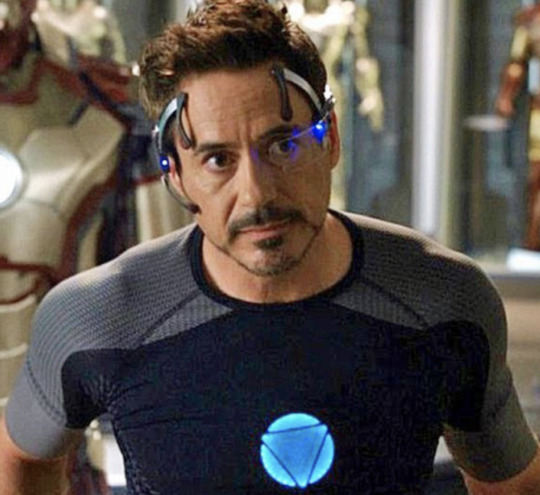
Or Tiny Tony. He is not actually canonically small, but he's smaller in the MCU than in 616 and from what I can tell, a portion of fandom has latched onto that. He’s a grown man, but RDJ is pretty short, and of slighter build than 616 Tony. RDJ is 5′9, but they make him act in heels, and I believe his canon MCU height is 5′11. Another popular trope I’ve seen is shrinking Tony in fanfic/fanart for a dramatized height difference with Steve, making him weak or fragile; this is fine because everyone has their own taste, but for the official record, he’s a capable, strong guy! Especially in earlier stages of the MCU, in which he’s a bit younger. Tony isn’t just a brain; he carries out his plans with his own two hands! He builds his armor, he remodels his lab, he survives hand to hand combat when he doesn’t have the armor. Muscles!
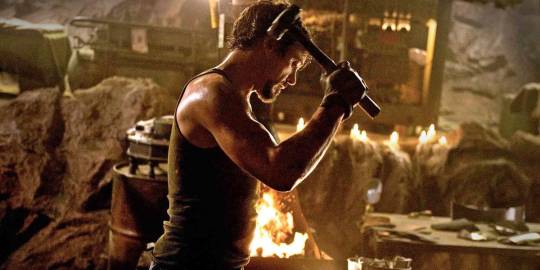
616 Tony is 6′1 without armor and 6′6 in armor (making him taller than his 616 Steve counterpart in armor and very close to the same height out of armor!) 616 Tony is generally paler with black hair (sometimes the classic blue-black I love so much) and blue eyes, and it obviously depends on the artist, but he has a pretty typically ‘masculine’ face and build. Generally he is drawn with a squared jaw and a high bridged nose (such as in the Extremis storyline, or drawn by Marquez), but again, this varies from artist to artist! Here's some examples of 616 Tonys.
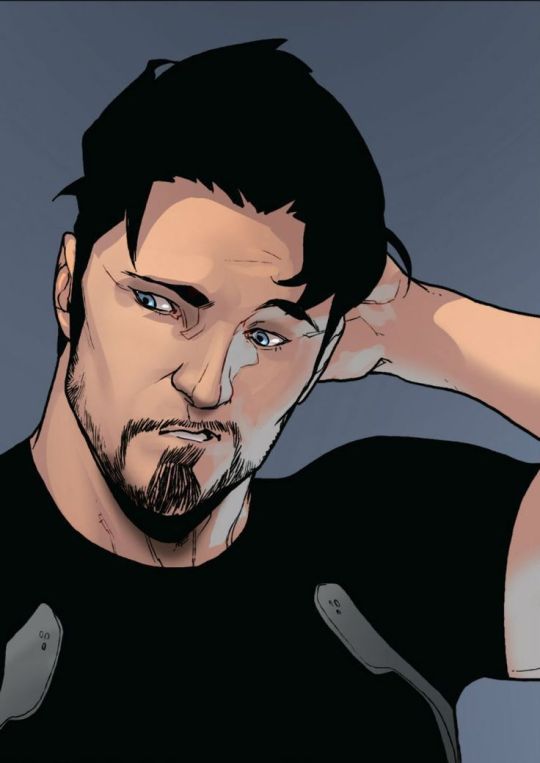
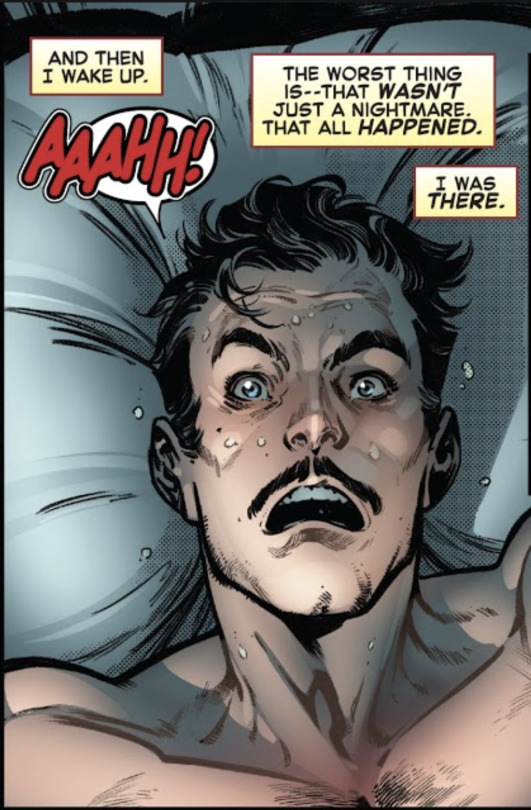
Wait, you might be saying, but I have seen comic panels where Tony has brown hair/brown eyes!
Yep. Due to a combination of forgetfulness, inconsistency, and the MCU bleeding into the general consciousness of the comics, sometimes Tony is randomly depicted in the image of RDJ, or if not in his image, at least visually inspired by the MCU-- hair color and style, eye color, dialogue, etc.
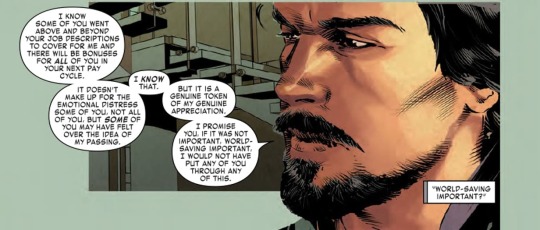
616 fans don’t typically love this; he’s very handsome when drawn this way, of course, (look at him!) But it isn’t really the same character.
Also, MCU Tony has (at least for some of his movies) a reactor built into his chest. While 616 Tony has, at times, been more or less physically connected/dependent to his tech, he doesn’t have the built in reactor (most generally speaking, there are times in comics when he temporarily has the tech built in, but this isn’t really the status quo.)
2. Relationship with parents/ family history
While it is definitely implied in the MCU that Howard was not a good father to Tony, (such as in Iron Man 2 when Tony says “You're talking about a man whose happiest day of his life was shipping me off to boarding school” and “He was cold, calculating, never told me he loved me, never even told me he liked me”), Tony has a different sort of attitude toward Howard in MCU than in 616. It’s kind of weird, and hard to discuss. To me, it seems implied that MCU Howard was emotionally abusive to Tony based on what Tony does say about his childhood, and yet, the films kind of randomly give Howard weird moments of “Well, he tried his best and deep down he loved me the whole time!” forgiveness. MCU has a Howard kink and I'm very cringe-face emoji about it.
For example, Iron Man 2 shows that old film reel of Howard talking about how Tony is the greatest thing he ever created, and in Endgame, when Tony goes back in time, he meets Howard and has a very weird interaction with him in which Howard declares he would do anything for his son, (to his deeply damaged son who is a new father himself.) Yet, for all his talk, it's his actions that speak, and his actions left Tony damaged, traumatized, and emotionally inept at forming healthy relationships. So.
Sorry. I’m a little bitter. I'm just uncomfortable with how they sort of set up an abuse history but then treated it kind of lightly and Howard gets off the hook as "well, he tried his best" without really acknowledging the hurt he caused.
Avengers: Endgame 2019
I won't go super in depth into the abuse stuff because it's a little touchy and could take up a lot of this post. But.
I’m not against any reconciliation and I do appreciate the fact that a lot of times, victims of abuse feel a desire to forgive and reconnect with their abuser-- my issue with the MCU depiction of Tony and Howard is that Tony never really gets the vindication of his abuse being recognized for what it was before he forgives Howard. To me, that’s not forgiveness as kind of... gaslighting himself that it wasn't as bad as he remembered his own experience being, because of a sense of nostalgia and grief. It’s not the same, and I have issues with it.
However, a lot of my opinion is based on subtext and it is just my opinion; with depictions of abuse, different people are going to react differently, and other people may have found these scenes touching and gotten something positive out of them, and that's totally fine too!
It’s also a bit difficult to talk about Tony’s relationship with Howard in 616, for a few reasons: shifting timelines, lots of canon that I have not read all of, and the fact that it really is difficult to sum up such a complicated relationship.
Right off the bat, I’ll address the basics. I used the same scene in another ask, and I think it's frequently cited in any meta regarding Howard, but in Iron Man Vol. 1, we see more into Tony’s childhood and see Howard verbally abusing his family, drunk, at the dinner table.
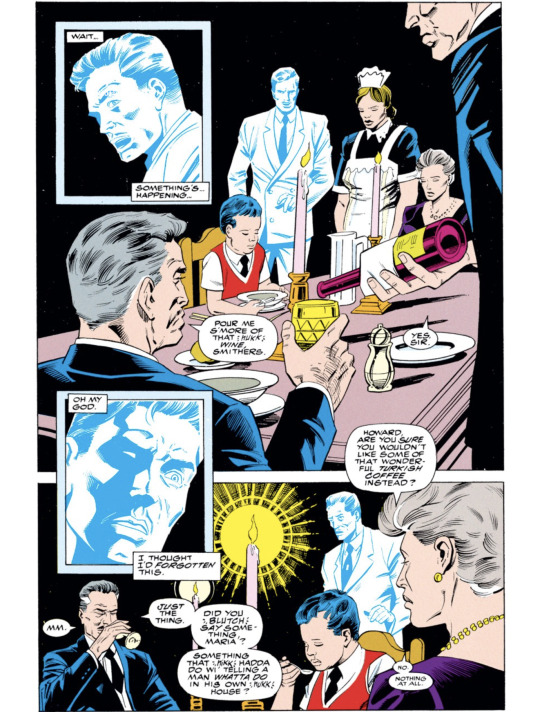
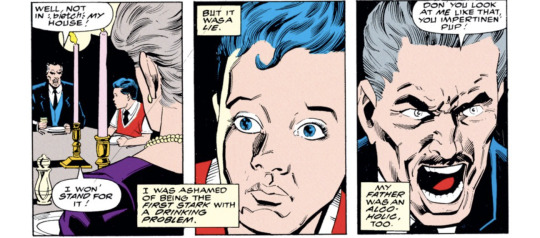

Iron Man Vol. 1 #285
We get this scene with adult Tony’s retrospective commentary on how his own issues that he blamed himself for were actually a cycle starting with his father, the insecurity and abuse and alcohol, and that he realizes how much this has influenced him. Both MCU Tony and 616 Tony have some form of “stop the cycle of shame” arcs, but I don’t really see how this works narratively in the MCU because Tony makes excuses for Howard and continues to blame himself for a lot of his own personal struggles, whereas I think there’s just a bit more nuance in 616.
But uh. This isn’t totally true, and in recent years, things got real weird. I choose to ignore this chapter of canon, but in the Dan Slott run, Tony Stark: Iron Man, Tony’s whole backstory gets imploded. For one thing, the little of Tony’s childhood it shows in a flashback is uh. Uh. Well, it’s certainly out of character compared with previous 616 material, depicting Tony as an overly confident poor sport.
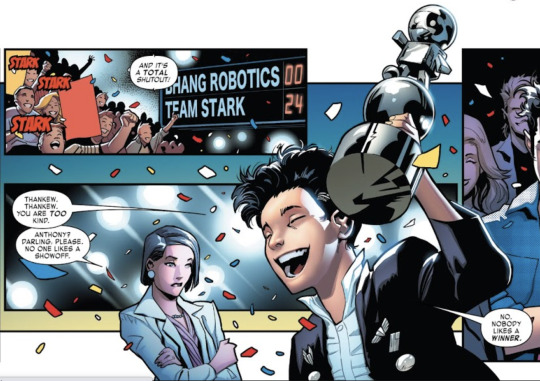
Basically, Tony is adopted. Tony has an evil brother. Tony’s biological parents make an appearance, as do his ‘classic’ parents, Howard and Maria. It’s just weird. It’s kind of out there. I’m honestly not a huge fan of this and ignore a lot of it, but it is certainly a difference between MCU and 616.
3. Personality
I’m going to be very general. Both Tony’s have an outer self which they present to the public and an inner self, but they’re a bit different. Both Tony’s have struggled with self loathing, but I think MCU Tony’s actual self worth is a bit higher, even just at some points in time. Even if his ego is part of his facade, I think he does believe some amount of the “I’m awesome”, even if just when it applies to his own work/inventions/saving people. Not to say that these moments of fluctuating self esteem make him egotistical, but this combined with his egotistical act and snarky, non-stop sassy dialogue, he’s quite different in general personality from 616 Tony, who is much more reserved.
Some more recent iterations of 616 Tony have been adapted to reflect the snark of the MCU, but he’s not so snarky and he tends to approach things more seriously. This is not a dis on MCU Tony; I think MCU Tony uses false ego and excessive sassy jokes as a means to deflect and control, which I think is very interesting and it’s nice to see this explored more in depth in fic where you get to see the thought process behind the bravado. MCU Tony is a partier, a good times guy, especially during Iron Man 2, in which he really does disregard consequences to have fun (driving his race car, partying drunk in his suit, letting pretty girls play with the armor, shooting off repulsor blasts for fun in a crowded room); I’m not bashing MCU Tony-- I think he had psychologically understandable reasons for behaving this way, the man was dying-- but 616 Tony really doesn’t act this way generally, and I think it’s a personality difference more than a difference of one being “better.”
616 Tony handles his stress differently, and they just have different psychological patterns, I think. I’m coming up kind of blank trying to think of a good comparable 616 arc, (sorry, I’m brain dead) but a less-than-perfect example might be Tony’s brain delete arc; he’s “dying”, like in Iron Man 2 he knows his expiration date, (circumstances are quite a bit different), but he throws himself more into work, into a cause, and as he really fall apart, we see him spiral into self doubt, remorse, fear, and insecurity, sort of falling into himself with lots of manly tears and calling himself pathetic.
(Some things happen in this arc that a lot of people find Gross. I also find these events gross. But. I don’t count the sex in “World’s Most Wanted” as partying to cope with personal mortality, because I think both character involved are in “end of the world” mode, and it’s more seeking intimacy for comfort than partying to numb the hurt. Does this distinction make sense? No? Perfect, moving on.) 616 Tony is generally much more humble.
Whereas MCU Tony, I think, tries to outrun those feelings via parties or making dozens of new suits, or seeking comfort by comforting others! Gifting things to people, building things for people, highly personalized individual living quarters, teaching Nebula games and trying to show her a fun time when they were in peril together.
They have some traits in common, for sure! But canon being inconsistent both in the MCU and in 616, my observations aren’t the rule, because I’m kind of cherry picking and going based on limited memory. But off the top of my head, they’re both extravagant gift givers! Recall Tony gifting Pepper the giant bunny in Iron Man 3, and compare this with Tony carrying a mile high pile of Christmas gifts after shopping with Rumiko in Iron Man Vol. #3.
I would say that while both Tony Starks are considered humanitarians, this is much more fleshed out and supported by canon in 616. Some examples of his philanthropy in the MCU: Tony makes charitable donations of art and money, Tony has an organization which provides disaster relief/cleanup which is referenced in Spider-Man Homecoming, Tony has an MIT grant for students and staff members. But to be honest, a lot of his MCU philanthropy is only mentioned in passing, or is largely handled by other people on his behalf and on his dollar.
In 616, we see Tony using charity almost as a means of therapy: it’s something he does very privately, not in the public eye (at least, not always), and it’s something deeply personal to him. One example that immediately comes to mind is Tony’s home for disadvantaged girls in Iron Man Vol. 3, and we see scenes of Tony basically driving the streets at night, picking up underage prostitutes, feeding them and listening to their stories before bringing them to a home he’s established where he knows all the residents, and provides educational opportunities and protection.
Another more recent example in canon that the Tony fandom loves is that Tony canonically holds babies at an orphanage. Sorry I don’t have panels for all of this, this section got long and I have been working on answering this ask in a very scattered way for a very long time.
Both Tony’s are romantics, I literally could write a whole other post about their canon love life similarities and differences, but I will briefly say that while MCU Tony does the long on and off, and eventual ultimate commitment, to Pepper Potts, 616 Tony is a serial monogamist; he is always falling in love, and he’s definitely not a playboy, but the hero-ing, self loathing, and lifestyle make it very hard for him to keep anyone in his life, and most of his partners fuck his life up and betray him. Needless to say, 616 Tony is not married, and certainly not to Pepper Potts.
Oh, and I guess this is so obvious I almost forgot to include it, but a huge similarity between both iterations of Tony is that they both constantly use their own life as a bargaining chip, and will pretty much die for anything. Or be the bad guy for a good reason (at least, in his own mind... see Civil War, or Hickmanvengers; 616 Tony, especially, does not shy away from making the hard decisions, and this leads to a lot of guilt and tension in his relationships-- often with Steve because 616 Steve/Tony angst fans are well fed, I guess)
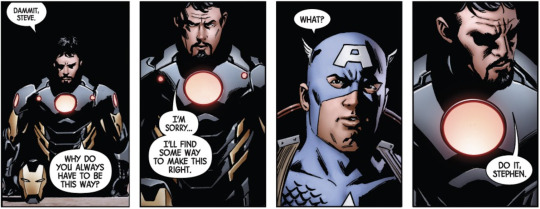
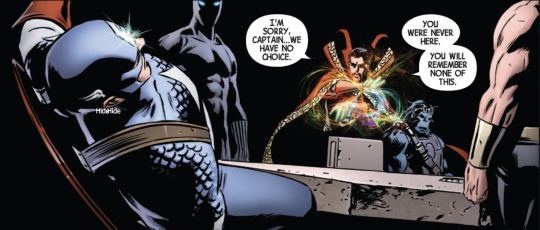
Remember that time Tony had Steve’s mind wiped because Tony felt that Steve’s inflexible morality might hinder the Illuminati’s ability to save the world? And it eats Tony up inside and erupts into a homicidal fight when Steve finally gets his memory back? Me too.
Tony Stark as a character is defined by sacrifice, both of his own life but also of his own happiness and reputation and conscience, I think, in a lot of ways, and we see this in many universes. I could go on about Tony’s propensity for sacrifice in the less obvious ways, because I think in terms of heroic sacrifice, Tony has done a lot that other heroes wouldn’t be able to do because of moral inflexibility and conflicting philosophical schools of thought; Tony really is the “whatever it takes” type, and often believes the ends justify the means if he deems a threat worse than the potential wrong that could be done in preventing the threat. We see this a little bit in the MCU in the creation of Ultron, and in Civil War with the Accords. But there’s a whole lot more going on there I don’t want to get into.
4. Alcohol
MCU Tony’s alcoholism is never really explicitly explored. He is shown drinking in Iron Man 1, and in Iron Man 2 he drinks a lot and makes a fool of himself publicly, but MCU Tony doesn’t get any specific narrative arc focused on his drinking, and if I recall correctly, I don’t think he ever refers to his drinking as alcoholism in the movies? Also, while his binge drinking and embarrassing behaviors ostensibly stop after the events of Iron Man 2, he is shown drinking on screen at least one other time after that which I can remember, and it wasn’t a “falling off the wagon” moment, and an alcoholic in recovery such as 616 Tony would not take a drink casually. This article sheds a little light on some decisions made about Tony and alcohol in the MCU.
Alcoholism is a huge part of 616 Tony’s personality, which I went a bit more into depth about in this post, so I won’t repeat myself too much.
5. Their relationships with the Iron Man armor
A few points here: MCU Tony is famous for the “I am Iron Man” line being repeated throughout the franchise after he blows his own secret in the end of the first movie. MCU Tony sees himself as one with Iron Man, and the suit is the tech that enables him to be this version of himself. He sees Tony Stark and Iron Man as inextricable: you cannot separate them, and his identity is public. He, as Tony Stark, is an Avenger.
You may remember MCU Tony’s induction into the Avengers; in Iron Man 2, Nick Fury is forming the Avengers and tasks the Black Widow with going undercover to assess Tony to be a part of a hypothetical initiative. “Iron Man yes, Tony Stark no” and the comments about Tony as a narcissist may be funny, but the fact is, the snark and erratic personality of MCU Tony at the time of the formation of the Avengers in the movies is not at all like the Tony of the comics, at the time of the Avengers being formed.
In 616, things are quite a bit different! Tony invents the Iron man armor to save himself (like in the MCU) and uses it for hero-ing, but in secret. He works very hard to protect his identity as Iron Man, and for a long time, as far as the world is concerned, Iron man is a mystery man piloting armor built by Tony, hired as Tony’s personal body guard, (hence the 616 Steve/Tony fandom’s proclivity for identity porn as a trope!) When the Avengers form, Iron Man is the Avenger, close friends with the Avengers, (particularly Steve!) and Tony Stark is just the benefactor of the Avengers, providing them with a place to live and finances with which to operate.
In the very early days, Tony did not have the “reactor” like in the MCU, but his chest plate did keep him alive, leading to some very dramatic shots of Tony charging up using a wall socket, lamenting the plight of a secret hero.

616 Tony, generally, and especially in some of these earlier comics, was quite reserved, rather serious, and very angsty, (in private of course.) He may be wealthy, but speaking generally, he’s much less ostentatious than MCU Tony, less of a show off, less into flashy things and grand gestures. Of course, this isn’t always true in the comics, and some iterations of Tony are more like this than others, but MCU Tony is showier, sillier, and more of a fun-times guy. Any MCU fan would find those panels quite contrary to the Tony Stark you know:
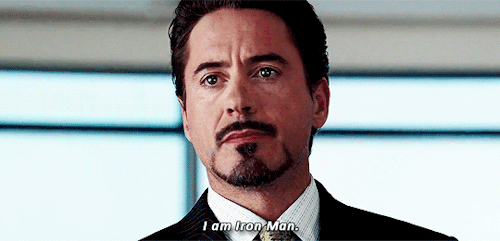
Iron Man 1

Iron Man 2
I think I would say that while MCU Tony sees himself and the Iron Man identity and the armor as all being inextricably connected, we see a bit more compartmentalization with 616 Tony, who pretends that the armor is a whole separate person for years when his identity was private, and we see instances in older and newer comics, in which Tony is uncomfortable with some aspect of himself as Iron Man (for instance, during the second drinking arc, Tony temporarily swears off being Iron Man entirely, or for another example, when Tony is in a comma and Tony AI exists during Secret Empire, Tony “lives” in the Iron Man suit, and I think this could be interpreted as a meta parallel to Steve during this arc; Steve has had some core aspect of his character inverted, Captain America becoming Captain Hydra, so Tony experiences a similar inversion-- Tony Stark and Iron Man are forcibly merged, in a way that Tony seems deeply uncomfortable with, if his digital drinking relapse is any indication. But I digress; sorry for the tangent.)
Okay this post is inexcusable long, and very, very tangential, and I don’t feel like I’ve really covered everything I wanted to. But it has been sitting in my inbox for too long and if I don’t post it now I never will, so I hope this long, rambling thing has been a little bit helpful to you! Thank you so much for asking, I had a lot of fun rambling about this.
If you want to read a similar post, but well written and organized, with other insights, this post by Sineala answers a similar question!
#Anonymous#han reads comics#han meta#meta#iron man#tony stark#616 tony stark#616#mcu#long post#han speaks#ask#sorry this definitely gets more incomprehensible as it goes on but i have been writing and rewriting and editing and fretting about this#for so long that if i dont just post it i probably never will and i sunk too many hours into it#to throw it away now 😅#abuse tw#abuse#alcoholism tw#alcoholism
56 notes
·
View notes
Note
if request slots are open: consider. i know you don’t like shoto but listen listen. royalty!au in which the darling is also a royal, of an opposing kingdom. shoto just thinks they’re so soft and lovely and why won’t they accept his marriage proposal?
This is pure self-indulgence, really. I just want to use fancy language and imagery and say nothing bluntly ever because straight-forwardness was only invented in the 1900s, and this is a reality I accept.
TW: Dehumanization, Abuse of Power, and Metaphors.
~
Your kingdom was known for never refusing a guest.
It was a state more than a nation, really, a wonderful city that relied on trade and unity to sustain itself. As such, you were more of a diplomat than a ruler, a host dressed in jewels and made to entertain true leaders from the allies held in such high-esteem by your advisors. You’d mastered the art of meaningless conversation, your patience taught to you by decades of being talked-over, and although many royals had seen fit to test your policy, there was always a free room ready when they were prepared to humble themselves and accept it. You adored that part of your occupation, how kind you got to be, to your people, traveling peasants, kings and queens and anyone who crossed your path. You liked to be generous.
But, Shoto was not a Prince known for bringing out the best in people. And you were certainly no exception to his contagious aversion.
Usually, you would make an effort to greet your visitors in the courtyard, but his visits were too frequent and too impulsive for you to do so much as stand before his entourage was in your throne room, the young Prince standing before you. He didn’t seem to mind your lack of enthusiasm, the boy smiling so brightly as he stepped in front of the elevated platform. You didn’t doubt he would run to your seat, if given the chance, but your personal guards made their aggression known as soon as his foot touched the first step of the short flight. “My Songbird,” He greeted, instead, not seeming to notice the way you cringed at the nickname. “You haven’t been responding to my letters, but my yearning still persists. Have you grown tired of singing to me so quickly?”
“I do not see why it’s necessary to respond to inquiries I have already answered.” Your voice was cold, at best, frigid at worst. You didn’t have it in your heart to be cruel to anyone, much less a friend you had once held so dear. Even with how appealing he made cruelty seem, these days. “I am not your songbird, but if I was, I think you would dread having to hear the same two notes play on a never-ending loop. God knows my throat has grown sore from delivering them.” You paused, glancing towards the advisor on your left, positioned there on the chance your behavior slipped into something less than agreeable. She waited a moment, pondering, but a nod was all you needed to proceed. “You must be tired, Todoroki, please allow my valet to show you to your chambers. A long journey deserves an even longer rest.”
You saw Shoto falter, a hand unconsciously coming to rest on the sword at his belt. You guards mirrored the gesture, although you didn’t take it as a threat. “I am thankful for any note you grace me with,” He assured, taking another step forward. “But, there are three that would make me euphoric. Isn’t that what you should want? Why would you sing at all, if not to make someone happy?”
Straightening you back, you leaned forward, uncrossing your legs to better fill your throne. “I sing for my own joy, no one else’s. Be glad I am forgiving enough to let you listen from a distance.” He opened his mouth, but you carried on, drawing circles in the velvet under your arms. “My answer is no, and there is nothing you can do to change my mind. When I find a shelter I can roost in, one I choose to roost in, then and only then will make my nest. I have no desire to make my home a cage, regardless of how golden the bars.”
At that, he smiled, and you dug your nails into the soft fabric. “It would be a beautiful cage, wouldn’t it?”
“You’re intolerable,” You mumbled, deflating. It was hard to be angry, now, the disappointment cutting through you more deeply than the knife of loathing ever could. Marriage was not a necessity, to you. Unlike his own clan, your’s had never placed an emphasis on blood. You’d been an orphan most of your life, and you had no issue with continuing the tradition your childless parents had started. Children who’d never known love always seemed more appreciative when receiving it, although you’d admit Shoto’s existence contested that theory. “I cannot–”
“And a beautiful cage deserves a stunning creature to inhabit it,” Shoto continued, speaking over you without hesitation. Another step was taken, then another, leaving Shoto towering before you, too close for comfort. You were tempted to stand, if only to put the two of you at an equal height, but Shoto would’ve simply found another way to place himself above you. He was good at that, especially if it meant making you feel small. “Think of it as an alliance. Your country would have my father’s army behind it, and I would have you. Is that not a worthwhile sacrifice?” You weren’t given time to answer his question, Shoto dropping to one knee unceremoniously, suddenly. It caught you off guard, enough so for you to lean forward, moving to help him up. But, Shoto only took your extended hand, holding your palm to his cheek as he spoke. “Visits aren’t enough, this isn’t enough. I wish to have you as my partner, and if I don’t, I can not guarantee my next action will be one of peace.”
You jerked back, not asking for permission before pushing yourself onto your feet. It took more of your self-control than it should’ve to keep from telling him to leave, to get out of your castle and never come back. Your anger must’ve been visible, because your advisor reached out as soon as your fists had a chance to ball, a steady palm coming to rest on your shoulder. It was a small consolation, but it snapped you out of your rage nonetheless, even if your calmness was still volatile when regained.
“Rest, Little Prince. Exhaustion has clouded your better judgment.” His eyes widened, lips contorting into a frown, but you didn’t give him a chance to refuse. Instead, you made the first move, waving for your guards to follow as you descended the short staircase. “If I hear one more word about marriage, I fear I may be the one to abandon our treaties. This songbird wishes to sing in another court, for now.”
Shoto was quick to stay on your heels, his excuses following just as closely. “But–”
“One more word,” You warned, his troop of guards and servants parting to let you through. “I don’t wish to make an enemy out of you. Please, enjoy my city and take advantage of my hospitality, but do not approach me with the same attitude. I have made up my mind, and my decision is final.”
And with that, you left. That was the advantage of his petname, you supposed.
Flying away was much easier when you were given wings.
But, Shoto was a beast of the ground, unfortunately.
He stayed as you fled, watching you run from him like prey from a predator. Part of him acknowledged your feelings, or the lack thereof, rather. He knew you didn’t love him, not truly, and he knew you didn’t care for him as he cared for you. He knew you didn’t want to be with him.
And yet, you were kind and welcoming and genuine. You were loving towards him, even if you didn’t love him.
Shoto took a moment to scan over the room. His guards surrounded him, as faithful as ever, each buzzing for an order. His father had never allowed him to travel lightly, even when Shoto was more than capable of protecting himself. Your nation didn’t have the same strength. With no standing army, no way to defend yourself, you relied on neutrality and alliances for protection. It was a symbolic security, but one that would stand unless a very powerful, very feared kingdom attacked.
Unless Shoto’s kingdom attacked.
He decided he would bring the idea to his siblings, as he waited for the room’s doors close behind you. It would be a controversial suggestion, but there was territory to be gained, resources that could help more deserving people. With their forces, it would be over in a matter of days, hours, even. He doubted your ‘allies’ would care, by the end of the week.
Besides, Shoto had a pet who needed to be put back on their leash.
You seemed to think you’d outgrown your cage.
#yandere#yandere love#yandere x reader#yandere x you#yandere prompt#yandere imagines#yandere scenerio#yandere drabble#yandere oneshot#boku no hero academia#boku no hero academia imagines#my hero academia#yandere boku no hero academia#yandere boku no hero academia imagines#my hero academia imagines#yandere my hero academia imagines#yandere my hero academia#bnha imagines#yandere bnha#yandere fantasy#yandere fairy tale#yandere prince#prince!shoto#todoroki x reader#yandere todoroki#shoto x reader#yandere shoto#shouto x reader#yandere shouto#yanderecore
475 notes
·
View notes